#but it's less common for these flashbacks to be not character development but PLOT development
Explore tagged Tumblr posts
Text
I love the way jjk doles out information because it's like. okay now we're gonna go back 1 year. now we're gonna go back 12 years. hold on though take a look at this from 10 years further back. now back to 12. okay really quick we're going back another 16 years (this is 28 years ago, got it?). OKAY now we're in the present again. wait SUPER fast we're going back 16 years,
#jjk#jujutsu kaisen#this is of course not counting the occasional references to sukuna and kenjaku's mortal lives a thousand years ago#everything started before now this is a story in process for a millennium we are just now dropping in#my nonsense#and obviously it's not uncommon for stories to flash back a decade or two to delve into character motivations#people are cumulative#but it's less common for these flashbacks to be not character development but PLOT development#it's often both in jjk
7 notes
·
View notes
Text
What I would change about these manhwas
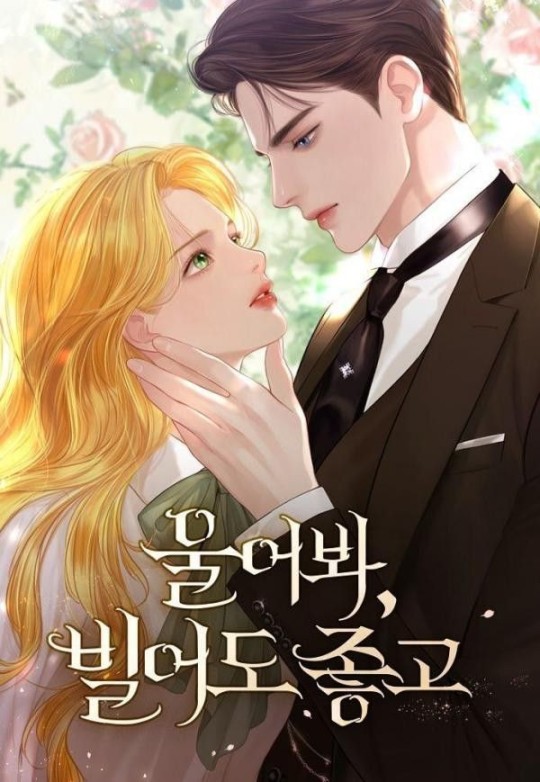
Matthias is the antagonist as he should be
Instead of a toxic romance story, it would be a story of survival in an abusive relationship
Would tackle the darkest parts of being a mistress to a rich man as a commoner
Claudine wouldn't be a villain and instead another victim of Matthias who becomes Laylas ally
Kyle is the new love interest
The ending would still be very tragic but Layla will at least escape her toxic relationship with Matthias

Obviously Javier isn't going to be the love interest anymore, that will go to Lucas
Javier also won't be a slave bought by Reilynn, they will meet normally and develop a found family like relationship
Iris will be more competent as a villainess
The empire would currently under the ire of the populace and on the brink of a revolution, meaning that Reilynn can't throw money everywhere to solve her problems while acting like a smug asshole about it without consequences thereby making room for character development
Her reputation will be lowered not just for the og villainesses past but also because of her latest behavior.
Reilynns new goal to avoid being sent to the guillotine by future revolutionaries would to try and become a better person with other allys like Javier to help her become more mindful of others

Honestly not much
Just have it be more faithful to the novel
Meaning Keira doesn't need a love interest
Ragibach learns Keiras game and starts to scheme with more strategy, making her an ever growing threat that gets stronger with each defeat she learns from
Zeke gets more attention
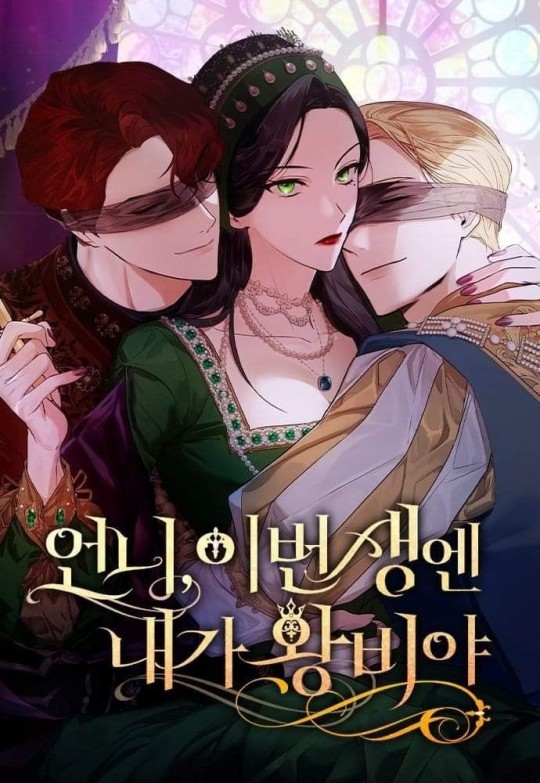
Ariande will still have the mentality that she's not wrong but it will actually be acknowledged as a flae
Isabella keeps her high intelligence and cunning behavior in the 2nd life
Ippolotio and Lucrezia are less cartoony villains and more disturbing as people
Larriesa is more then just a yandere fiancé, she'd have a backstory explaing her desire for love and her behavior will be toned down
Arabella would live longer then she did originally
Pretty much almost everyone will be an awful person with consequences
The golden rule will actually matter and give Ariande consequences when she does something evil
Ariande will try to understand her newfound powers instead of forgetting about them until the plot needs it
The first life will be referenced more

Hestia would be called out for her behavior
Cael would no longer be a cardboard cutout
Diana isn't the villainess anymore
The story would focus less on petty revenge but on all of the characters growing as people
The idea is how our biases for our favorite characters can cause us to literally distort the truth
As such instead of constantly blaming Diana until the very end, Hestia would focus on what SHE likes instead to get her mind off of it and discovers how thrilling life is again when she let's her revenge plot go
Cael's suicide would be treated less as a plot device to prove why Diana and Helios are evil but as an actual arc that brings up the real struggles of depression and suicidal thoughts
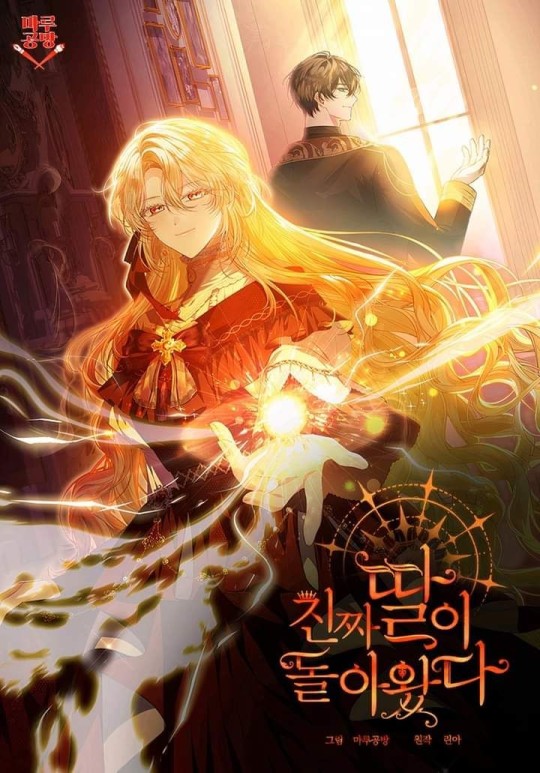
Helga would eventually stop taking everything out on Hilianne when she realizes it's not her fault the Duchess abused her
Of course this also means Hilianne won't be the punching bag
not all of the male characters will fall in love with Helga
lower Helgas plot armour SIGNIFICANTLY
let the other side characters actually use common sense and call Helga out on some of her bullshit
The running away plot would be handled better
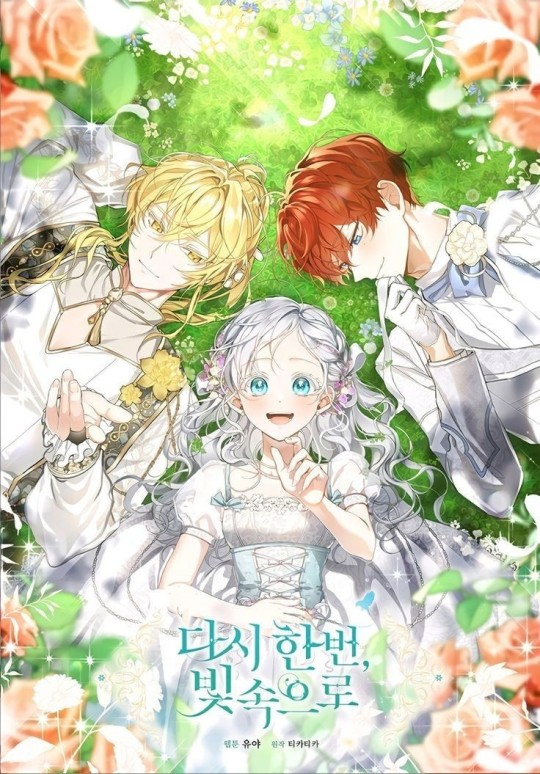
Include some more flashbacks on Alisas family in Edenverre and drop more lore on the siblings we knew less about
Marianne will have more screen time to properly explain how her powers work
Luminas will either not be the love interest at all and instead be a mentor fot Aishas later abilities or he could be MENTALLY Aisha age so theres no maturity gap (think of Luminas still being 2000 but he's physically and mentally a early teen like Aisha)
Aisha would actually feel guilty about the innocent people killed by her father just for being related to her assassin
Ysis and Aisha would have more realistic sibling moments (Ex: Ysis doesn't immediately believe that Aisha is a reincarnated princess of the enemy empire)

Aria will still be descended from commoners
The war between Aria and Mielle will be more equal, basically a battle of traditional villainess vs white lotus
Asher would have a life and personality outside of Aria
The maids would also be their own characters and have some dignity
Isis is actually utilized properly
#webtoon#manhwa#sister i am the queen in this life#actually i was the real one#revenge against the real one#into the light once again#cry or better yet beg#Villainesses have more fun#the villainess reverses the hourglass#for my derelict favorite
51 notes
·
View notes
Note
Best female characters?
Up until you mentioned the nitro standees release not including them I didn't think they existed
😂😂😂 Oh man, that's so fair and also sad because it's true. I think all of the games have at least one, but not much more than that and they're mostly as fleshed-out as you'd expect the women side characters of a yaoi to be. So this will probably be less "best" female characters and more... "here's a list of the female characters" LMAO
5. Togainu no Chi — There's two; I actually thought it was just the one until looking it up to verify but I did forget entirely about the second. First you have Emma, who is a plot device. She mysteriously shows up to set the game's shady events into motion, promptly fucks off, and basically does not show up again until one scene at the climax which not every route will see. She's given a dramatic backstory but she's mostly an exposition machine and ultimately feels pretty pointless imo despite her technically important role in the narrative. Then you have Yukari, who is even less than a plot device. She's the baby sister of a minor character, who shows up in a flashback/dream to establish that she's his motivation to fight. This is largely not relevant apart from giving sob story points to her brother.
4. sweet pool — Youji has a sister! Erika is soft-spoken and kind-hearted; the siblings have a deep relationship after Erika took over when their parents died, and while we only see her in person once, she still looks after her brother and pays for things like his rent and tuition. But she doesn't get a lot of screen time, mostly a few phone calls, and to an extent I feel like her presence is there to serve as a mirror to Youji's plight and even a tiny bit as bonus heartbreak points for him. All anyone has to say about her is how much the siblings look alike, and she spends the majority of the game pregnant (just in case you didn't get the hint about Youji's totally-not-menstruation/ovulation). And if he didn't have anyone to leave behind, what angle would they play to make his deaths tragic and not just a sad release from suffering? Anyway, she Bears Exposition to remind Youji of memories he didn't know about, and while I do like her and their scenes together, that seems to be her main purpose in the story. I thought they might do something more with her but was left disappointed.
3. DRAMAtical Murder — I can think of three I believe, at least that have names and aren't just faceless plot filler. Oh four I guess counting Re:Connect. Aoba's grandmother Tae is maybe the most relevant woman in a Chiral game; she's a gruff yet protective and caring figure in the story, and she and Aoba have a close relationship that gets a fair enough bit of screen time. She does also get to be the Bearer of Exposition as well as play a bit of damsel in distress, but she gets a bit more development and heart than pretty much any of the other ladies. Besides her you also have Yoshie, a yappy middle-aged gossip at the delivery office whom Aoba does not like and I, the player, do not like, as well as Mio, a tween brat who occasionally comes in a trio with tweedle dee and tweedle dum to fuck up Aoba's workplace. They're both encountered a few times in the common route and don't really have a significance beyond proving that Midorijima has people living in it that aren't just a few random gay bachelors. Aoba's mom Haruka also shows up for a bit in Re:Connect — I kinda thought the backstory chapter would have something more interesting going on, but other than showing off their design and personalities, it didn't really give any more insight to Aoba's parents than we already had. She's not present in the main game and kind of adopted a kid just to turn around and shove him onto Tae instead, so I mean... mother of the year over here
2. Lamento — Despite writing a setup for an all-male society, they do have two female side characters in Lamento. You've got Mana, a prostitute who you ply for information, who only briefly appears in a scene or two after that. She's pretty assertive, but you could remove her from the story entirely without altering the narrative. Kagari has a more active presence; a friend of Asato's mother who is a stand-in family for him, she is straightforward, stubborn, and a fighter of equal stance to the men. She's actually plot-relevant to Asato's route, and yes, does get to be a bringer of Important Backstory Info. I wish I liked her more, but I do prefer her to some of the other girls. There are (deceased) mothers mentioned in passing, but other than one getting some lines in a drama CD, we never see them.
1. Slow Damage — There's some girls in this one! And some trans characters that may or may not categorize themselves as girls; between translation and cultural nuance I'm not entirely certain whether that's accurate for the Roost trio, but personally I saw them as two trans women and a femme-aligned nonbinary person. The trans trio are friends of Rei, and while they're fairly dramatic and sometimes flamboyant, they're also pretty down-to-earth and get to have serious moments and careers. They don't have a huge role to play in the overarching story, but their presence is felt and gets to have an impact. They're also a deathmatch team and a pretty successful one at that, so they can hold their own with the rest of the cast (and at no point does their gender or presentation get brought up at all in regards to their fighting, as far as I can remember.) There's an old woman who runs a sweet shop, whom Towa is fond of despite her brusque or straight-up rude attitude, and a couple of service workers who are met once and get slightly larger roles later on, as well as some faceless filler characters similar to DMMd. Without getting too much into it for spoiler reasons, there are also two other important women who greatly haunt the narrative even though we don't encounter them in present-day.
{"Make me stack-rank my toxic yaoi" asks}
5 notes
·
View notes
Note
To answer your question about the reaction of non-fans regarding the show’s tone, I watched the first 3 episodes with people mostly unfamiliar with OP, and their verdict was that it was fine. These were their impressions:
They didn’t have a problem with something mixing cartoonish action with violence (if anything they thought the biggest issue with the tone was that it wasn’t consistently weird/stylized *enough*) BUT they did have a lot of moments where they’d go “wait why did that happen” during scenes, mainly having to do with the character development. One asked what Nami sewing the straw hat at the end of episode 2 had to do with the rest of the episode because she and Luffy were separated for 3/4 of the runtime and all of Buggy and Luffy’s conversations were about Shanks abandoning Luffy and being an outcast. And all of them were just as confused you were about Zoro’s development.
Another friend similarly thought it was weird that the setup for episode 2 had Nami saying she hated pirates and disliked Luffy, but then the episode itself was more about Zoro and Nami bonding and proving their loyalty to Luffy instead of the other way around.
They hated the flashbacks. Mainly because they felt the editing and segues into those flashbacks made the backstories feel tacked on at best and intrusive at worst - not helped by how they thought the pacing in those flashbacks was clunky and way too fast; even started laughing in disbelief when Usopp’s mom died just because of how it happened in less than a minute.
Got REALLY restless and bored whenever Garp and Koby were on screen.
One friend also thought that the Den Den Mushi were meant to signal that a person was a villain because the expressions on the animatronics read to her as *In Constant Pain* and therefore were meant to be seen as animal cruelty, and because so far only antagonistic forces have used them. She was VERY surprised when I showed her what they look like in the anime/manga and went “wait but those are cute”
All are in agreement that Buggy is the highlight of the entire show so far. “Surprise shithead” and Buggy punching the glass got the biggest laughs of the night.
Do enjoy the action (think the sword fights were the best) and enjoy the sets. They did start to notice a lot of those sets didn’t get a chance to shine because of all the closeups though.
Episode 3 left them kinda cold. Not just because of the flashback, but at the end one friend went “Did this Usopp guy just leave his sickly friend alone in a mansion with 3 murderers just to run *all the way* back to town to ring a bell, even though Luffy and Nami are much closer? What an asshole” So I think on that front the show kinda failed to capture the essentials of Usopp’s character in the abridged timeframe.
One friend also said at the end of the night ��This is fun, but it’s not really *about* anything...” He later elaborated that he thought that the episodes we saw were more like a string of Things That Happen, and the character’s actions all seemed to either just exist in a vacuum with no connection to other characters or parts of the plot, or they make choices that don’t make sense unless the characters have read the script.
So yeah, overall my friends unfamiliar with OP said they enjoyed it well enough, certainly had some laughs, but also weren’t in a huge hurry to finish the series. But it’s hard to say if the sentiments they held are common since I haven’t had the chance to talk with many other people talk about it in person. As for me, I’m just kinda letting it digest and waiting to see how I feel about it a few months from now.
Ohh this so interesting!
I share most of that. Specially in ep 2. I absolutely love LA Buggy and it was the best part of the ep but the rest of that ep was so off. It was an exposition episode and i agree the actions of Zoro and Nami were out of the blue, they barely shared any screentime together and suddently they were already so loyal to Luffy just bc. If onlynif was the one thing that actually annoy me, particulary Zoro's development (in ep 3 they madenit right tho) I wasnt sure if it was just me and bc the comparison with the anime or like an actual thing so thank you for that input
The sword fights i love, i really really really do
That read on the den den mushis gave my whiplash but i so get it
Garp and Koby are really interesting to me but bc they are new and i want to see the direction they take, but is mostly curiosity, so that to me is a new way of seeing it too
But mostly your friend is right, im also at ep three and if you strip away all the world building we know from the anime it does feel a bit like a succesion of things happening, but also like a check list of thing that happened in the anime and that must be covered. I get it tho bc run time and all, but its a shame thats the read for a first time watcher that doesnt know about what couldnt be fit in the ep and that helps understand a charecter or a scene better.
#i know it seems i only rant about the show in these asks but actually im really enjoying it#ask#ask: opla
40 notes
·
View notes
Text
Parallels between Scratch and Pete in the episode ¨Dance Dad Revolution¨
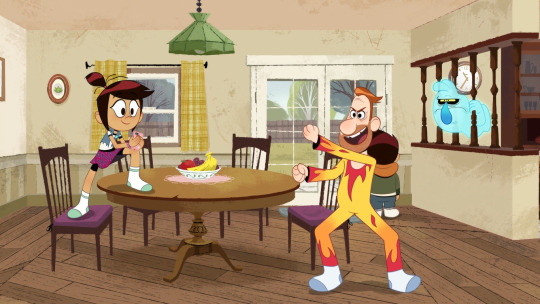
Dance Dad Revolution is an episode that involves Pete and Scratch becoming influencers (with Scratch being less literal) by using dance as a way to get people's attention. While the motives to start dancing as a way to influence people differ, the episode puts the two plots in parallels with each other, highlighting character traits the two characters have in common and how they react when they get a taste of being popular and having power over others.
In this post i'm going to discuss the characteristics Scratch and Pete share in common and how they develop through the episode. Let's start:
On first point both characters share similar backgrounds of being over and pushed around by other people. Both were mocked constanly and made fun by people in their social environment.
For Pete, he grew with his older twin siblings,Billy and Jilly, who would usually mock him, tease him, put him down and humiliate him. This made Pete develop certain low stem and it implied that is part of where his constant anxiety and nervousness comes from.
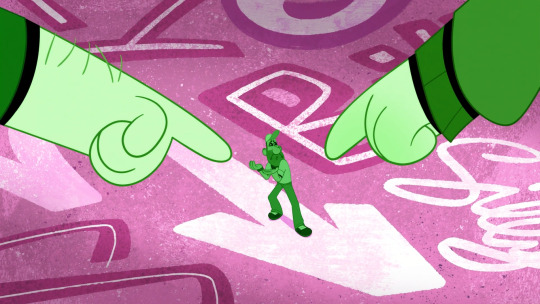
In the flashback from Ice Princess, Billy was shown making fun of Pete when he fails in his ice skating routine and crashes. In the episode ¨Twin Trouble¨ explores Pete's relationship with his twin siblings when they come to visit the Mcgees. Pete spends a good part of the episode regressing to his young self instead of the more confident person he is in the present. He starts wearing clothes like he used to back when he lived with his siblings and using his Boston accent.
When he sees Darryl imitating the twin siblings, Pete snaps and finally stands up for himself. He calls out his siblings behaviour, telling them that he is an adult now and will not put up with their behaviour any longer. The episode ends with the twins admitting that that the way they treated Pete was wrong and implying that will respect him from now on.
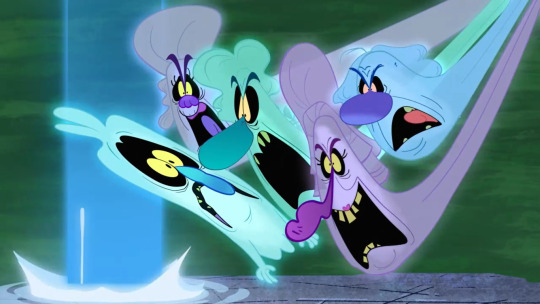
As for Scratch, his case is more serious since he was constanly controlled and abused by the Ghost Council, who were his bosses in season 1. They would usually make fun of Scratch or threatening him with sending him to the Flow of Failed Phantoms. Many ghosts would treat Scratch poorly due to his low social status and not being a ¨popular ghost¨. Scratch would often be ignored, insulted and pushed around by ghosts who were in the elite class, seeing him as inferior. Scratch had to hide his friendship with Molly and the rest of the Mcgees as well, since ghosts being friends with humans was seen as ¨unnatural¨. If a ghost was found out to be friendly with a human, they would be sent to the Flow of Failed Phantoms.
Most of Scratch's arc in season 1 is about him opening up to others and making connections. He starts off as distant and closed off, only with time to warm up to the Mcgees. Around half of season 1 he starts to consider the Mcgees his family. Later Scratch befriends Libby and Geoff and he is seen hanging out with them in some episodes.
Over time Scratch opens up to Molly about how he is treated by the Ghost Council in the Ghost World, like how he can be sent to the Flow if he isn't considered scary enough. In ¨A Very Hungry Ghost¨ he tells Molly that the Ghost Council can't know that he is friends with Molly because that would mean be taken away from her forever.
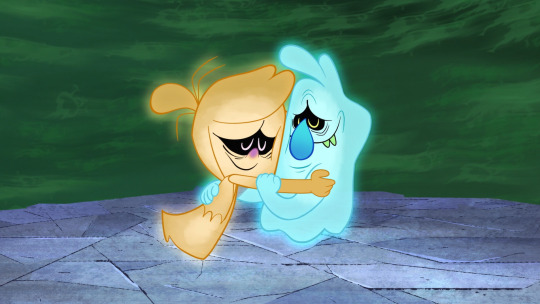
It is in the season 1 finale ¨Molly vs The Ghost World¨ that Scratch stands up for himself and tells the Ghost Council that he doesn't care about what they think of him. He fully admits that Molly is her friend, expressing how she is right about being kind and helping others. After Molly destroys the Chairman using her joy powers, Scratch and Molly return safely to the human world, not having to worry about the Ghost Council bothering them anymore.
So both Scratch and Pete were used to being mocked and pushed around by others for years. For Pete is when he lived with his twin siblings and for Scratch when the Chairman was the ruler of the Ghost World (and some hints that this happened when he was human too).
In ¨Dance Dad Revolution¨ it involves both of them finding themselves in position that they are listened to and they are respected. And, because they aren't used to that, they let the fame go up in their heads.
For Pete's plot, which is the A plot, it starts with Pete trying to get the mayor's attention to explain why plastic bags are bad for the enviroment and they should be banned from Brighton. The mayor ignores Pete's presentation, being distracted with the clipclop app. (A clear parody of tiktok).
Then Pete decides to try to get people's attention by using social media. Molly explains to him that he can try making a short video with him dancing to get his message across. Pete tries Molly's suggestion, the video becomes viral quickly and soon the plastic bags get banned from Brighton.
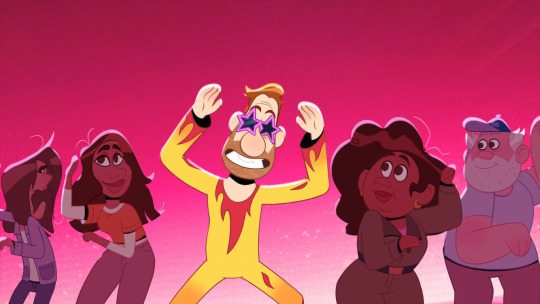
For around the first half of the episode Pete continues to make dance videos to reach out to other people and bring up certain issue. This works for multiple things. The problem is that Pete begins to change his goal of making videos to spread awareness and instead it turns into how many likes he can get. The sequence song potrays pretty well how he starts losing focus from what was his first goal and he becomes this snobby influencer persona that only cares about his popularity.
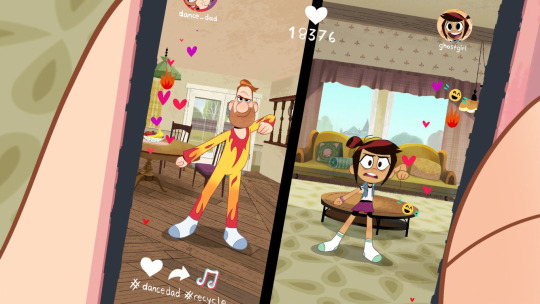
Molly sees that her father needs an intervention to realize how he has let social media turn him into someone inconsiderate and self-centered. She asks Pete to sit in chair in the living room with the rest of the Mcgees and shows him a clic clok video they and other Brightonians made for him. In the video is about them dancing while they talked about how Pete has gone to far and they missed how he used to be. After finishing watching the video Pete realizes his mistake and asks Molly to take control of his social media account. He admits that he became addicted to his influencer persona, showing how it can transform people.
For the B plot of the episode, it is about Scratch doing his chairman duties. An important part of this season deals with him having to deal with the responsibilities that comes from being ruler of the Ghost World. Something that he wants to avoid in every possible way and is scared of doing to some extent.
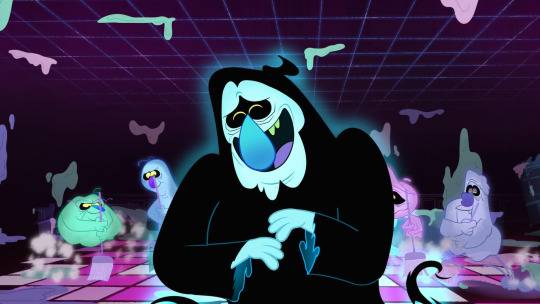
Once he hears from Darryl that people would do ¨anything¨ if one dances, Scratch decides to come up with a dance to make other ghosts clean the club that is filled with ectoplasm. Many ghosts do Scratch's chairman chores, thinking it just a fun ¨dance¨ when in reality is Scratch taking advantage of his position to make others do his duties for him.
Eventually the ghosts get tired of doing Scratch dance and want something new. They see Geoff and Jeff doing a dance that spread ectoplasm all around the room. Scratch asks them to stop before he realizes that it is too late, the whole room is filled with ectoplasm splattered everywhere and Scratch realizes that he has to clean all the mess all over again.
Both plots drive a lesson about how people who aren't used to having power or influence can let that get the worst of them and turn them into different people. In Pete's case it is about someone who deviates themselves from their original goal to help their community to chase views. In Scratch's plot, is abusing that power and avoiding his responsibilities, something that comes to bite him back at the end.
This episode shows well these parallels between Scratch and Pete, the reason of why they act the way they do and how they have to face the consequences of that behaviour at the end.
#the ghost and molly mcgee#tgamm#scratch mcgee#pete mcgee#tgamm season 2#dance dad revolution#tgamm analysis
24 notes
·
View notes
Note
Ramble to your heart's content: 🔥🔥🔥 :3
- @asea0fmxses
This ended up being a large ass thing so let's just count this rant as three unpopular opinions
Okay okay so in HB it's been a common complaint that the women are not written all that great, or at least are not given as much development as the male leads. Which is true let's be real, how long did we have to wait for episodes focused on Millie and Loona?
I still think it's funny how when Queen Bee finally dropped people were all like "glad we finally got a loona episode ppl can stop complaining the show never focuses on her" which???
Lmao the passive aggressiveness of that statement???
But also yeah we want one of the main cast to actually be important to the plot and treated with some level of depth and then get an honestly pretty mid episode then she's barely focused on every again but she got one episode so OOP WE CANT COMPLAIN NO MORE 10/10 FEMALE WRITING YA'LL
Okay I'm being a little mean for comedic purposes and with Loona in particular there were later issues with the VA, copyright stuff, etc, etc. Stuff they simply couldn't account for so I can be a little forgiving
Less so with Millie and Stella, especially in Stella's case but I've rambles my ass off about that in particular. They're doing Verosika more justice but even then she kinda only pops up when it revolves around Blitz so it's a take it or leave it
The character done DIRTY the most though?
Barbiewire
Literally the sister of Blitz, someone you think would be one of the most important characters given so much of the story focuses on him and his trauma but she's barely even there. She appears in one episode (not accounting for her being in some photos in prev episodes) and then proceeds to vanish
There was no build up to her character or Blitz looking for her, there's been no real follow up, she kinda just exists to make Blitz upset but even then him being broken up she cut off contact with him isn't addressed either, she doesn't get that much development or exploration even though she arguably has a pretty interesting past, and I'm kinda baffled she's still made in the show at all
I mean she doesn't even show up in flashbacks, which is funny because in the original storyboards she WAS in them but she was cut out so this was a deliberate choice
The fact that fandom has largely forgotten about her too speaks volumes which sucks as SHE COULD BE REALLY COOL
They could have done literally a million different things with her, make Blitz looking for her a running plot point throughout the series with there being a lot of mystery over what happened when she left rehab, how Blitz actually cope with the fact the only family member he still loves doesn't want to talk to him anymore, have her show up to help Blitz because maybe she does still care because relationships like this are frustrating
Hell
*MOTIONS TO LOONA*
HAVE HER INTERACT WITH HER LITERAL NIECE???
OR
*MOTIONS TO FIZZAROLLI*
THE SUPPOSED CHILDHOOD FRIEND BOTH SHE AND BLITZ SUPPOSEDLY HAD???
Like bro even if Millie and Stella aren't the best written characters they have narrative weight at least, bro, Barbiewire is the most useless addition to the show and it shows painfully. You could literally write her off as a one off gag from season 1 but even then we've had season 1 characters impact the overall show more THAN THE SISTER OF THE MAIN CHARACTER
It also sucks as I've had a few mutuals who wrote Barbiewire purely based on what very little we've seen in the pilot and they still managed to craft a more narratively important and interesting portrayal than canon. And it's not I think it's a direct result of bad writing, it really does just feel like Viv values every other character more than her which is sad
#⛦ ⥗ 𝐀𝐒𝐊𝐒 // ❝Wandering souls❞#unpopular opinion#ask to tag#i have some thoughts#{ ⛦ 𝐎𝐎𝐂 ♰ } ❝You’re in that odd space between heaven and hell❞
2 notes
·
View notes
Text
Hey, Dungeon Meshi have the explanation for why folk seem stuck in medieval status for millennia (like a lot of fantasy), cool!
Admittedly the explanation here (after an ancient war between each other elves and dwarves kind of block attempts by other folk trying to replicate any of the advanced science or magic used in said war) is a touch different from explanations I've seen elsewhere (such as: with a world where magic can work in the same way as technology, why in a world with people with very long life-spans would people invest in the harder, manual method of doing the same thing), but it explains why folk in the flashbacks to the distant past appear to live exactly the same way to folks in the protagonist's present day.
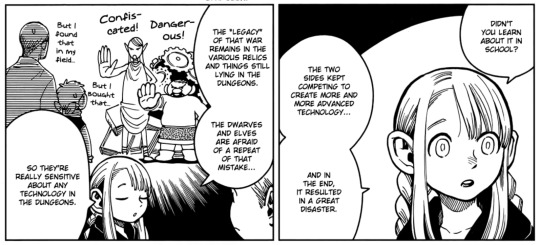
In terms of worldbuilding, I honestly kind of prefer the idea of longer lived folk deciding to aggressively use their position to block attempts at research due to past wars or disasters as it both opens of both retroactive chances for Lore as well as interesting consequences over what happens if folk decide to research the forbidden stuff regardless.
The show Arcane also hinges on this idea, with the main plot involving the fallout (sometimes literal) of folk combining magic with technology and effectively starting an industrial revolution with the resulting "Hextech". The show also has a centuries-old character who both witnessed what happened in the past that made magic less common place in the present (mini-apocalypses all over the shop), only for his oblivious condescension towards shorter lived people results in him eventually getting pushed out of his leadership role for standing in the way of Progress/Capitalism.

And just with the industrial revolution in real life, the Hextech one in Arcane does greatly improve the standard of living for some folk as well as granting them all the benefits the stuff can produce... while also measurably making the lives worse for working people with the resulting pollution, overcrowding in urban areas etc.
Both Terry Pratchett's Discworld series and the animated Avatar shows and comics also deal with the idea of an increasingly industrialised fantasy setting. In the Discworld there were multiple instances of (often magically-induced) inventions cropping up (such as rock music, cinema, shopping malls) only for them to also be the harbringer of something awful, leading to folk being a touch suspicious when more permanent advances begin happening (starting with moveable type and the invention of newspaper journalism in the Truth), expecting some kind of eldritch beastie to show and start wrecking the place.
But from that point on the Discworld setting moved forwards as things like the steam engine and a form of primitive telecommunication network spring up, and what began as more fo a typical fantasy parody setting evolved into something closer to the contemporary audience's.
Meanwhile, in Avatar, while the industrial revolution technically started prior to the events of the Last Airbender with the Fire Nation's discovery of steam-power, the comics that bridge the gap between the finale of Airbender and the start of the Legend of Korra sequel series go into depth about the pros and cons of the shift from a mostly medieval status society that technically very similar to the one the audience sees in a flashback to 10,000 years ago.
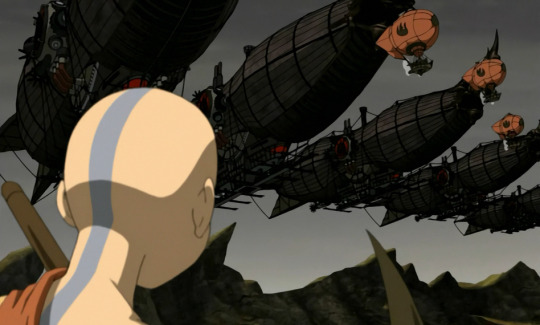
A narrative line through the comics involves the increased industrialisation and globalisation during the post-100 Year War peacetime, with the heavy implication that Avatars prior to Aang may have stopped attempts at one nation developing to far so they wouldn't throw off the balance with the others (the invention of steam and a desire for resources fueling the Fire Nation's colonialisation and imperialist ambitions being used as an example of why "Progress" leads to disaster).
Avatar notably goes the Arcane route of showing that technological advancement has pros and cons (even with the discovery of electricity and cars by the time of Korra, society still functions in a way that overtly benefits those with magical, element-bending powers more, as well as pollution, urban crowding and poverty etc.), but the result of this is that the changing world also gives rise for the opportunities for stories you might not have if things stayed... static.
This is contrasted with, say, the Chronicles of Narnia where from the setting's creation to its end things stay pretty much storybook medieval fantasy (even though human society is founded by a cabby and his wife from Victorian London, along with other folk who landed there by falling through gaps between the worlds). Meanwhile in JRR Tolkien's work, the idea of an advanced, industrialised past is present (along with wars and disasters), but due to creator JRR Tolkien's hatred for the industrial revolution in general, all of that is either locked in the backstory lore or only used by the bad guys.
I just think it's neat. And while it's unlikely we'll see any wider societal changes in the world of Dungeon Meshi (no spoilers, following via the show and reading the manga afterwards), the fact that the Medieval Status trope of a lot of (western, at least) fantasy is acknowledged is great.
#dungeon meshi#dungeon meshi spoilers#fantasy#writing#worldbuilding#arcane#discworld#avatar the last airbender#the legend of korra#the chronicles of narnia#middle earth
3 notes
·
View notes
Text
Turn Week, Day 7: If I Could Change One Thing...

Aside from the obvious wish of getting all five seasons, it's too bad the show wasn't more character-driven rather than plot-driven. I understand why it was, and I still find it absolutely great and a comfort show, but I'm the type who watches for characters and their interactions. I felt robbed of these dynamics, in particular: Ben and his father, Nathaniel (they should've talked about Samuel sometime after 1x10); Ben and Sackett (I wanted more crazy!uncle x nephew-esque shenanigans); Ben and Samuel (it would've been way more impactful to see some brotherly flashbacks prior to his d.eath), and more of the Culpers in general. Even though they were best friends who grew up together (sans Townsend), it never really felt like it since no one ever truly reminisced or cracked inside jokes, nor behaved like close friends beyond the occasional quip (unless you count the Ben x Anna prank in 2x4). Granted, I understand that it's a time of w.ar and thus, levity isn't as common, but they are human, and it'd make sense for them to behave as such from time-to-time. It can't be b.usiness 24/7.
Secondly, every Culper had some form of t.rauma, so I really wish the show had delved into that beyond the surface. Here are some thoughts centering around the individual characters:
Ben: I wanted to see more of his struggle with faith. A man of God betrayed the Cause (Rev. Worthington), and then he shot him in cold b.lood. That assuredly messed with him, and his guilty conscience had to have suffered even more so once he discovered his own side was responsible for Sarah's husband's d.eath. Then when he learned Hale's last words had been warped for the sake of furthering the Cause, rather than his friend being truly remembered as Hale wished to be, Ben learned right then and there that history could and would be altered by people he admired (GWash) to justify the means -- himself included. The knowledge that he and his friends were more or less pawns undoubtedly added to his anger in S4, in particular, and I wanted to see a genuine struggle with all of the above rather than superficial scrapings.
Abe: After his imprisonment, he definitely should have suffered from some type of P.TSD, yet he more or less just "walked it off" after shaving his beard and cleaning away the grime. Most people can't recover from that type of event unscathed, so it would've been interesting to give Abe an actual character arc beyond a.dultery and his brief turn-around in S4.
Anna: The night she was attacked and had to s.tab/s.hoot that Queen's Ranger undoubtedly stained her for a long time. Maybe an allusion to night terrors or making her jumpy could've helped, rather than just turning it into a cliché girlboss moment.
Caleb: Arguably, Caleb got s.hafted the most of this group. He always struck me as more of a punchline rather than a real person, because comic relief characters are rarely multi-dimensional in terms of development. It's sad that just when the writers were finally giving him an arc, it was cut short and sped up to meet with the time constraints. I don't think it was a poorly done arc, per se, but naturally, I wish we could've seen it drawn out and given the proper time and dedication that was originally intended.
39 notes
·
View notes
Text
PTSD or C-PTSD?
Hopefully, you’re not one of the muns out there who has slapped a “PTSD” label on your muse(s) for drama only. You are, instead, treating this topic with respect and the realism that comes with that, not only having it accurately impact your muse when it’s convenient and “fun” for you. Well, that respect and realism includes actually knowing and applying the correct diagnosis and symptoms as well.
In your defense, if you have misdiagnosed your muse, common terminology in media and even among trauma sufferers is often just the blanket-statement of PTSD. Also, as the abbreviations imply, they do have things in common.
To help, I’m going to break down their differences and similarities, then provide some research links including personal accounts to help you get started.
PTSD
Post-Traumatic Stress Disorder most often comes from a single traumatic event.
What can be a traumatic event can differ widely, and reasonably so; we’re not all the same person, processing events and emotions the same way, or with the same formative life experiences. What might cause PTSD to develop in one person might be processed by another as a frightening or painful incident, but not one that has left them with PTSD. The symptoms, individual, and incident have to all be taken into account.
That being said, some examples would include:
having a severe accident
being mugged or in a store that is robbed
physical or sexual assault
being involved in a shooting, in any way
death of a loved one
an unexpected explosion or sudden, natural event like a mudslide or tornado
a severe natural or man-made disaster (building collapse, mass flooding)
events outside of oneself like witnessing a violent assault, murder, deadly car accidents, terminal illness or injury
Again, it is important to remember that individuals react in individual ways, and as such, their symptoms can express with some variation. Don’t just mimic the same presentations you’ve seen in media, research a variety of real experiences.
However they manifest, key symptoms of PTSD include:
Re experiencing the event by way of nightmares, flashbacks, and repetitive, intrusive, and intensely upsetting images, thoughts, and sensations. This is the most common symptom of PTSD, in which the person involuntarily and vividly relives the trauma.
Avoidance and emotional numbing, going to extremes to avoid not just potential triggers, but also finding any way possible to push memories of the event out of their minds. When the latter occurs and is extreme, the person is trying to feel nothing at all, seeking a path to emotional numbness. That can include substance use and abuse, self-harming, and other harmful behaviors.
Feeling on edge (”Hyperarousal”) is the ultimate inability to relax, constantly looking for threats, perceiving threats that are not to be found, and being easily startled. Some of the common issues with being locked into this state include difficulty sleeping or even insomnia, severe irritability and irrational seeming aggression, angry or aggressive outbursts, and finding concentration difficult to impossible.
Some other things that might develop with PTSD are:
Other mental health concerns like anxiety, depression, and/or phobias
as said above, harmful behaviors like self-harming and substance abuse
physical symptoms like headaches, stomach and digestive upsets, dizziness, and generalized pain
Like all disorders, PTSD is complex. I, again, implore you to research not only information put out by psychiatric professionals but also the experiences of real people.
C-PTSD
Complex Post Traumatic Stress Disorder occurs when a person experiences repeated, consistent trauma, especially at an early age.
That doesn’t mean that adults cannot and do not develop C-PTSD, they do, and for a variety of reasons; adult sufferers have the same points of origin in the diagnosis as children do. Additionally, it may take years for someone to seek help, feel their symptoms are severe enough to need to, or be able to extricate themselves from the situation in order to receive help of any kind. They may be an adult by the time this happens.
The important thing to remember about C-PTSD is that it isn’t a single traumatic incident, and you are more likely to have this form of PTSD if the trauma occurred early in life, it was inflicted by someone close to you, and/or was inflicted by someone you still see on a regular basis.
Some good examples to give you the idea include:
ongoing domestic violence
child abuse and/or neglect
being raised by a parent with a severe disorder like Narcissistic Personality Disorder
repeatedly witnessing violence or abuse
torture
kidnapping
being a part of a cult
being a victim of human trafficking or slavery
It isn’t “complex” because it is always across the board “more severe.” This isn’t simply “even worse PTSD,” and shouldn’t be treated like that. Its source is more complex, the development and embedded varieties of its impact are, and the ongoing treatment is.
Particularly when C-PTSD occurs in childhood, there are lasting effects on a person’s development. They have developed in an environment that constantly has them highly stressed both physically and psychologically, and in which they learn many ways of coping, lessening or negating harm, and so on, that leave them less than optimally functional and integrated in life outside the situation.
While the person has the symptoms of PTSD, they will additionally exhibit:
difficulty developing and/or maintaining relationships of any sort
intense, consistent feelings of worthlessness, shame, and guilt
problems managing and even understanding their own emotions
suicidal thoughts
dissociation
increased risk-taking behaviors
Those who have had their actual development rerouted to deal with the situations that generate C-PTSD have a higher incidence of physical symptoms, suicide, self-harm, substance abuse, and are at higher risk of repeat victimization.
They might go for some time without realizing that their daily experiences are neither the norm nor something sustainable, or how atypical their traumatic experiences were compared to those around them. It can sometimes take a serious life-event (suicide attempt, drug rehab, losing too many jobs, homelessness, or finding themselves in a genuine, loving relationship) for them to fully recognize something is wrong, and even then, their feelings of worthlessness, ingrained lack of self-confidence, and belief that they don’t deserve any better can prevent them from seeking help outside of themselves.
They may also believe that something is just “wrong” with them, that they are innately messed up, or that they have a different mental illness. And the unwillingness to open up to people, relieve events, etc. can additionally leave them unwilling to seek or continue care when they believe they have a different, underlying problem. Again, choosing to deal with this themselves through self-isolating, self-medicating, and seeking only relationships and jobs that will work within the framework of the disorder as it effects them.
Additionally, many sufferers of both C-PTSD and PTSD experience the same sense of societal shaming surrounding mental illness. They may struggle with denial, and refuse to seek assistance due to the stigma and all it entails.
Shared aspects of PTSD and C-PTSD
They’re both, obviously, severe, life-altering trauma experiences and resultant disorders. They both easily make the sufferer feel like the trauma and disorder is impossible or undesirable for others to deal with, that they are not worthy of being in close relationships, among many other similarities in experience living with either disorder regardless of widely varying traumas.
They share psychological and physical impacts, and there is a lot of overlap.
The core symptoms of PTSD are shared with C-PTSD:
relieving the trauma(s)
avoiding and emotional numbing
hyperarousal
The shared physical symptoms can include:
headaches
nausea, stomach ache, and digestive upsets
difficulty sleeping and insomnia
sweating, clamminess
chest pain and difficulty breathing
manifestations of low-grade to severe pain
dizziness
Shared behaviors can include:
difficulty concentrating to outright dissociating
self-harm
substance abuse
being hyper-vigilant, easily startled
may seem to be over-reactive to/in situations that others are perceiving as normal or not that big of a deal due to lower perception of personal emotions and lower emotional regulation
including explosive anger or defensiveness
development of anxiety and depression disorders, the symptoms thereof
Again, both PTSD and C-PTSD are serious disorders caused by trauma, and they both need to be treated with respect and accuracy when written into a character - be that an OC or a canon character. It is unfortunate, but these symptoms and the realities of life with either disorder are often portrayed badly in wider media, and the RPC often imitates what it sees.
PTSD and C-PTSD, like the incidents of trauma that created them (rape, child abuse, domestic violence, miscarriage, etc.), are not a plot-point, other point of interest, or a character trait, let alone a “character flaw.” They’re not something you only bring up for attention, to get your muse out of a bad spot, or to add dramatics when you’re bored in a thread. Neither are they something you need to attach to your muse simply to give them A Label. These are, I cannot stress this enough, serious topics, and they deserve to be treated that way.
You can do that by defining which variety of PTSD your muse may actually have, then adding research of both the disorder and how it impacts a variety of real people. Making your muse more realistic and being dedicated to sticking with it.
Below are some links to get you started on research! Please note, the real stories, as well as some information, may be graphic or triggering. Read responsibly.
C-PTSD
Out of the Storm - Personal Stories of C-PTSD
-Contains real stories from those with Complex Post Traumatic Stress Disorder. Their experiences have a huge range; bullying, childhood neglect and abuse, and sexual abuse and assault.
I Have Post-Traumatic Stress and Didn’t Know It - and You Might, Too
-Personal story of living, unknowingly, with C-PTSD. An especially great read for writers who have muses who hold a lot of responsibility in their daily lives, who may not realize their experiences are C-PTSD related, etc. Contains discussion of parental emotional abuse, mental illness and childhood trauma, and rape.
What is C-PTSD?
-Excellent resource for detailed breakdowns of C-PTSD giving without a clinical, impersonal tone. The definitions of the disorder itself, symptoms and how it manifests and impacts daily life, and much more. A highly recommended source, and one with further resources on-site.
11 “Habits” of People Living with C-PTSD
-Short breakdown of C-PTSD, followed by snippets of specific experiences in the words of those living with the disorder, a relatively short article.
PTSD
Rebecca’s Story: Living with Post-Traumatic Stress Disorder
-Personal story of a woman living with PTSD from, in short, being stalked by a co-worker. It’s an excellent article, particularly for how mental illnesses sufferers are treated and portrayed, and how that adds another layer of difficulty to their lives. Obviously, this may be triggering to those who have been stalked, and includes mentions of graphic threats.
My experience of PTSD
-A personal story of medical trauma resulting in PTSD. Many of the PTSD stories you’ll find are from women and involve sexual trauma or harassment, in trying to find a variety of stories, I’ve found this one. By this point, you should be noticing many similarities in these stories, regardless of specific trauma.
Leaving the Battlefield: Soldier Shares Story of PTSD
-So many muses experience PTSD through battle-related incidents, and those depictions are not always accurate in media. This is a personal story about one soldier’s experiences. His perception of PTSD, denial, and shame at having the disorder is something that echoes throughout the previous accounts. So do the similarities of daily struggles to maintain to regular life. Before anyone wants to get Tumblr Nasty about it: there isn’t any “war propaganda” present in this story, the location of it is irrelevant to what you’re supposed to be learning here. It’s literally this man’s experience, don’t.
Post-Traumatic Stress Disorder
-Breakdown of symptoms and causes from Mayo Clinic, so obviously, this is more clinical-minded. Particularly useful for its lists of things like “symptoms of negative changes in thinking and mood” and increased risk-factor for other disorders.
I hope this helps you to assess and write more accurately your muses with C-PTSD or PTSD, and to consider these things more fully when having your muse experience a traumatic event in your plots.
-------
Please, remember when you are reading these accounts, and anywhere you might encounter PTSD sufferers; these are REAL PEOPLE. Treat them and their stories with respect. You’ll note that, unlike other posts on this blog, I didn’t advise you to approach the source. Many trauma sufferers won’t be comfortable sharing their experiences for the sake of your creative hobby. You may, at your respectful discretion, discuss this with close friends you know to be impacted by PTSD, just keep in mind that respect, discretion, and only bringing the topic up when they are comfortable with it, with specific questions, is necessary here. These are not fictional characters! Do not write someone’s real experiences into your character, thread, etc. verbatim, that’s...fucked up. Thanks in advance for being responsible, respectful adults, from a real life PTSD sufferer. -Vespertine
#rp help#rp advice#muse development#character development#writing advice#muses with ptsd#muses with cptsd#cptsd and ptsd post#muse inspiration#diverse muses#neurodiverse characters#rp better
501 notes
·
View notes
Text
BATMAN: Hush v The Long Halloween
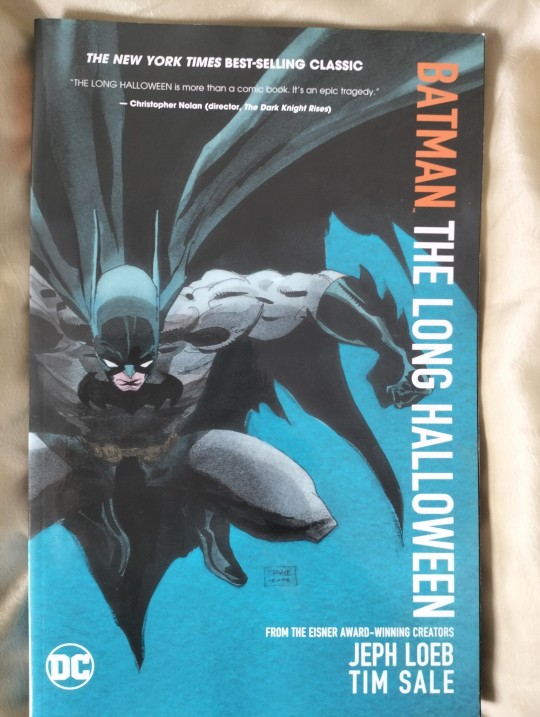

So I finally got around to finishing Jeph Loeb's Batman: Hush (prior to this I had already read The Long Halloween)
It was good.
Had a pretty straightforward plot and was easy to follow.The dialogue needed work in areas, notably the jokes, the monologue was okay for the most part but there were certain small things that irked me.
Batman in this story, isn't quite as stoic or feel as calculated as he does in other stories because during the whole thing he's undergoing a phase of change, we can see he doesn't want to let another Jason Todd incident happen to Tim Drake being part of it but the main change being that he's fallen in love with Catwoman (again).
Expanding on Bruce's childhood and life before batman by the introduction of Tommy Elliot just felt like a dead giveaway that Tommy was either going to die or turn out to be a villain. What happens next being so predictable sort of cheapened the effect of the flashbacks but maybe that's just my opinion.
Tommy Elliot also felt incredibly bland, like, very fuckin generic. He was a Scooby Doo villain, that's literally what he was. He wants revenge because as a child an unaware Bruce accidentally saved Tommy's mother's life by asking his father to operate on her. Tommy who tried to kill his parents loathed this and developed a hate boner for Bruce Wayne.
Jim Lee's art is spectacular as usual, so is the colouring.
But I personally do prefer Tim Sale's style on the Long Halloween.
The couloring especially.
It felt more expressive, they used flatter and more tonally dull colours to create an aesthetic, used light and dark imagery so cinematically, it was like they wanted to create art instead of creating something that was flashy and looked cool. No hate to the colourist who did Hush but I just feel like it could have been more interesting is all.
Tim's art style was also extravagant, each character looked like a cartoon but the grounded colour scheme really brings the reality aspect back to it and it just feels... Right.
It differs from Hush a lot but the monologue in Hush makes sense in context. It's not written as diary entries but instead it's literally batman's every thought, it can often waffle and drift into childhood memories at random times.
I like both but I prefer the diary entries used in The Long Halloween over Hush.
Both had a great mystery and kept me guessing who the antagonist would be but Hush just felt like it was missing something.
It took me a while to figure out but it's Gordon. Hush had Catwoman, Robin and Superman as the supporting cast but they don't feel as strong or as interesting of a trio as Batman, Harvey and Jim. Not only are the cast of Hush less charismatic but they also feel less connected to the plot and Batman mythos compared to Jordan and Harvey.
The endings for both were brilliant tho, it's actually really difficult to choose which one I like. The mystery is uncovered but nobody wins. To put it bluntly overall the two stories have quite a lot in common but The Long Halloween takes the cake.
Tl;Dr:
The Long Halloween - 9/10
Hush - 7/10
#character analysis#comics#marvel#batman#dc comics#dark knight trilogy#the batman#superhero#batfam#review#writing#critique#bruce wayne#jim lee
3 notes
·
View notes
Note
would you mind talking more about bart and unreliable narration? I always hear people say unreliable narration but I've never seen any concrete examples from media I actually consume so I'd love your thoughts
Oh absolutely!! I actually wrote a thing about this a while back but then went 'this is not well written' and it got buried in my drafts, so I’m glad to have an excuse to pull that up and rewrite it. (Also sorry, this got really long.)
Basically, at one point I was listening to a podcast (Be the Serpent, ep 4), and they categorize different kinds of unreliable narrators into three types: the narrator who knows they are lying to you, the narrator who is lying to themself (and therefore you), and the narrator who is lying because they are missing some key information. I would argue that the three main pov characters of the Bartimaeus Trilogy each represent a different type of these unreliable narrators.
Going in backwards order, Kitty is the narrator who lies because she is missing some key information, at least until the third book. As a commoner, even one who is part of a resistance movement, her knowledge of magic is extremely limited and biased. Were we to go off of her point of view alone, we would get an inaccurate view of this world and the power dynamics that exist within it: that magicians are somehow special in holding magic and that they have evil demons who work alongside them in shared mischief/hunger for power/whatever.
However, because the books include other points of view, the full impact of that unreliability is not realized.
Similarly, Nathaniel lies to himself, especially in the later books. He ignores how much he personally contributes to upholding a system that depends on the oppression and slavery of other sentient beings, and squashes down the last traces of his moral compass. I don’t think he ever really questions the system of government or if it should be there and work the way it does.
To some extent, we do see through his unreliability as well, because Bartimaeus is around to keep a check on him and tell the reader that no, the magicians and their imperialism are bad, that spirits have very good reason to hate humans, and give us other world building details that contradict what Nathaniel believes.
But some of it is about what is going on inside Nathaniel’s own head, so there is also a lot that can’t be fully seen by an outside perspective that has to be assumed by the reader. Like he will deny the sentimental feelings he has towards Ms. Underwood and the guilt he had over Kitty’s supposed death and the fact that he even remotely cares about Bartimaeus, but actions speak louder than words.
Because both of these characters’ unreliability stem from a lack of understanding, having other perspectives in the book in some ways cancels out their unreliability, and actually ties their unreliability more to their character development than as a plot/narration device. Kitty grows more reliable throughout the series while Nathaniel gets less so until the end. This doesn’t make that unreliability useless though, especially in a series aimed for children. By getting each character’s point of view, we can see where they are coming from and how the knowledge and views they have affect the way they act, but there is also someone else to point out how they are wrong, to make you question how true what each individual says is.
Bartimaeus is entirely different from the first two characters. His narration is told in first person, unlike Nathaniel and Kitty’s third person. He talks directly to the reader and goes off on tangential footnotes that are not necessarily part of the events currently happening in the story. Because of this narration style, he also has the power to lie more directly to the reader than any of the other characters.
Given his life, it is understandable how he has gotten into the habit of lying. Every moment of his existence on Earth is spent under the power of someone else, so he lies in order to protect himself. There are some instances where he lies to his masters in order to escape punishment or to lead them into danger so he can be set free, but he also lies about his feelings because he cannot afford to be emotionally vulnerable.
For the most part, I think it can be assumed that the dialogue and most actions that happen in his pov chapters are told as they are, since much of that lines up with what goes on in the other characters’ perspectives, and also there are at least a few things that show him in a less-than-flattering light that he would probably leave out or change if he could. Instead, the lies he tells are largely about his past and his emotions, often done through exaggeration or omission, and cannot be collaborated by others.
When lying about his past, Bartimaeus frequently exaggerates his prestige and role in history. In Ptolemy’s Gate, Bartimaeus says that he talked to King Solomon about Faquarl’s tendency to brag about his historical importance. Even beyond the obvious irony, in the prequel we see Bartimaeus’s time at Solomon’s court, and while it isn’t technically impossible for him to have talked to Solomon about Faquarl, the timing and circumstances make it extremely unlikely. Although his other stories cannot be proven or disproven with what we know, this instance and his general tendency to brag outrageously makes it very likely that Bartimaeus at the very least embellishes.
However, despite being super showy about his past, Bartimaeus doesn’t actually include much important information. He very rarely talks about his great feats as a thief or assassin or anything else. When he lists his accomplishments, he describes building walls and talking to important historical figures. There’s a post somewhere (if I find it, I’ll link it) that explains this as being a way for Bartimaeus to try to take control of his reputation and therefore his life; by associating with safer jobs, he is less likely to be summoned for very dangerous and morally reprehensible jobs.
He does generally try to portray himself as clever and collected and just generally more cool than he actually is. There’s a moment at the end of the first book where he describes himself as trying to calm Nathaniel who is freaking out, and then the next chapter is from Nathaniel’s pov which describes him as being the calmer one while Bartimaeus is a fly anxiously buzzing around.
I don’t remember the exact line, but in the second book there’s an exchange that goes something like this:
“____” I said calmly.
“Stop your whimpering,” Kitty said.
The way Bartimaeus portrays himself is straight up contradicted by the more factual account of the words and actions of someone else. And presumably there are plenty of other times that we do not see contradictory evidence where Bartimaeus straight up lies about how he is reacting to something.
But one of Bartimaeus’s most unreliable points centers around humans. Throughout the books, he constantly talks about the ways he has killed and would like to kill his masters, if given the opportunity. Nathaniel is an exception, one that Bartimaeus does admit to the reader, but even in the third book when he talks the most about how he would kill Nathaniel or even join a demon rebellion if Faquarl offered right then and there, Bartimaeus does not actually follow through on these threats when he gets the chance. Despite all of his talk about how much he hates humans, Bartimaeus has as much of a positive relationship he can have with as many humans possible, given the circumstances.
A lot of his unreliability centers around Ptolemy, which is what some of Bartimaeus’s biggest lies of omission are about. In the first book, we do get the sense that Bartimaeus has a soft spot for at least some humans. His excuses of saving and looking after Nathaniel in order to avoid Indefinite Confinement, while likely not entirely false, do fall a bit flat. We even get a mention of “a boy I had known once before, someone I had loved.” Although this is not explicitly connected to Ptolemy at this point, mentions of brown skin and the Nile make a pretty obvious connection to Ptolemy, especially as Bartimaeus describes taking on Ptolemy’s form several times later on. There is a less obvious hint too, “I sat on the ground, cross-legged, the way Ptolemy used to do.” Even without knowing much about what kind of relationship Bartimaeus had with Ptolemy, that kind of detail shows ‘a devotion to detail that could only come with genuine affection, or perhaps even love.’
It isn’t until the third book until we learn anything substantial about his relationship with Ptolemy, and even then he doesn’t tell the whole story. The fandom jokes about how Bartimaeus just casually mentions in a foot note that he prefers a lioness form because the manes are annoying, and it’s not until the flashback that you find out that the mane is part of what got Ptolemy killed. And even with the flashbacks, you still never see the time that Ptolemy visited the Other Place.
There are a lot of posts on this site that talk about how Bartimaeus absolutely was idealizing Ptolemy, and how there’s some evidence that he isn’t the perfectly sweet never-did-anything-wrong innocent child that Bartimaeus describes him as (notably that part where he was vaguely annoyed that people kept coming to him to ask for help and interrupted his research). Not that Ptolemy secretly sucks or anything, but it’s really easy to let nostalgia skip over the less dramatic details of Ptolemy being an actual human being with flaws.
In summary, I would argue that all of the trilogy protagonists are unreliable narrators to varying extents, and Jonathan Stroud is a genius for how he manages to make it all work.
176 notes
·
View notes
Text
Review #17: I Think Our Son Is Gay (Volumes 1 and 2)

Japanese title: うちの息子はたぶんゲイ (Uchi no Musuko wa Tabun Gay)
Story and art: Okura
English publisher: Square Enix
Number of volumes: 3 in English, 4 in Japanese (ongoing)
The power of open-mindedness.
(This review contains story spoilers.)
Family is a pretty common source of conflict across the series I’m covering for this project. It’s often framed in the context of the main character not knowing how to come out to them, and this can get quite severe depending on the plot. There are cases where it turns out well, with the family accepting them for who they are, but there are also times where the family outright disowns the character because of their sexuality.
On the more optimistic side of the spectrum is I Think Our Son Is Gay, another series that doesn’t really fall under the BL genre in the traditional sense. As the title suggests, instead of the main character being the guy who’s pining another, the story focuses on the guy’s mother, Tomoko, who suspects that her eldest son, Hiroki, is gay. “Suspects” is a pretty generous term, though, as Hiroki is just about the worst person to keep his true feelings a secret. Most of the early parts of Volume 1 focuses on Hiroki letting his guard down and trying (but failing) to retract what he just said, though they’re mixed in with what is essentially the core of this story - how Tomoko learns to understand and accept her son’s situation, and even support and encourage him in being more honest about his sexuality.
Right off the bat, I found it an extremely fascinating premise, as not only does it bring a lot of good vibes - and the series delivers in that regard in spades, even when it gets to more serious topics - but it also makes for a fascinating character study with how different the approach is. Add on to that the story’s more laid back format - the chapters are very short and usually only cover one scene, almost like they’re vignettes - and it gives the series the space to slowly build both Hiroki and Tomoko’s characters and turn them into realistic, holistic, and very lovable people.
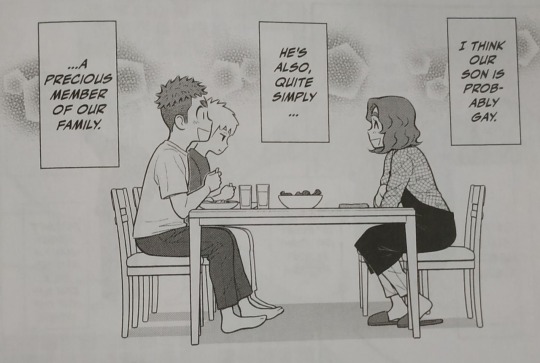
True to her wholesome and motherly character, each of these chapters ends with Tomoko’s introspections about what happened within them, usually a specific event about her son’s struggles with his sexuality or his swooning over his crush, Daigo. The series is quite on the nose with these being hard lessons for the reader to learn, and part of me does think that it got a bit monotonous with how often the “so the moral of the story is” line of thinking came up. I would’ve rather that the lessons be implicit in actual dialogue between characters rather than be directly addressed to the reader in the form of Toyoma’s thoughts.
At the same time, though, reading all of these “lessons” as ones that Tomoko aims to learn for herself makes them a really nice way to see how her character develops. The early chapters are pretty simple with these introspections - her suspicions about her son slowly evolve into certainties - but it’s very nice to see her slowly understanding her son’s situation and doing her best to make him feel more comfortable about it.
This is on full display when it involves her husband, Akiyoshi, who is pretty far behind Tomoko in terms of open-mindedness. There is already a sense of distance between the father and his sons as Akiyoshi is away for work most of the time, but his less than ideal views on gay relationships puts a pretty solid wall between him and Hiroki. Tomoko immediately picks up on this, though, and does double duty in breaking this wall down - she not only reassures Hiroshi that what he’s feeling is valid, even if he himself hasn’t admitted to them yet, but also tells Akiyoshi in her own indirect way that his views on love, marriage, and relationships could be more encompassing.
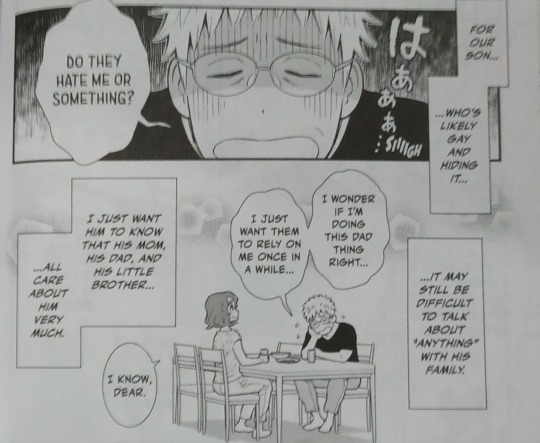
All this is even more admirable on Tomoko’s part once you get to the final chapter of the first volume, which shows a flashback of her finding her son’s browsing history on her laptop (which is just about as telling as you’d expect). Unlike her more nonchalant reactions to Hiroki’s slip-ups throughout the volume, this first instance is seen to very much worry her, and she finds it hard to comprehend and let alone accept that her son is gay. Unexpectedly, it’s a call to Akiyoshi that changes her mind, as his questions about whether or not Hiroki is doing fine leads her to answering normally and realizing that, even with this new development, he is still the son that he’s loved for all these years.
I think this chapter was really important in contextualizing Tomoko’s journey, as it shows that she herself had misgivings that she eventually overcame. As much as I wanted her to be this perfect, ever-accepting mother figure, having her own doubts makes her a lot more realistic, and it makes watching her growth all the more sweet to watch.
She isn’t alone in her journey to understand and accept her son though - she also has Yuri, Hiroki’s little brother and unquestionably my favorite character of the series. Unlike his brother’s over-the-top displays of emotion, Yuri is a lot more chill and level-headed about pretty much everything, always donning a straight face and being very observant about the things happening around him. This is a pretty obvious contrast to make between the two brothers, and their dynamic is just about as hilarious as you’d expect.
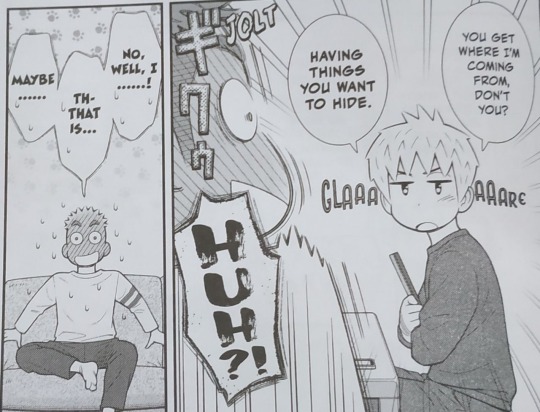
But what elevates Yuri for me is how he himself has his own journey of accepting and understanding Hiroki’s sexuality, though a lot of it seems to have happened off-screen. It’s hinted early on that Yuri already has a good idea of what his brother’s situation is about, and he even helps Hiroki out when dealing with their father’s awkward questions. He’s also seen using it against Hiroki from time to time, though it’s all in good fun - there was a never point where I thought Yuri was making fun of Hiroki for being gay, but rather he just makes fun of his brother for how ridiculous he acts about it.
And then we get Chapter 37 in Volume 2, which gives us a pretty good idea of why Yuri came to accept and support his brother. It was hinted earlier in the volume that Yuri is pretty popular with the girls in his class, but he hasn’t shown any interest in pursuing any of them and simply wants to be friends with them. This turned out to be an issue when he was younger, which shows him rejecting a girl and being ganged up on by other guys in his class. His reason for the rejection is because he doesn’t understand what love is, and he was more than content with maintaining friendships, but the other people in his class don’t see eye to eye with him in that regard.

It’s then revealed that Yuri ends up understanding more about love by observing his brother, who is seen openly pining for one of his friends back in middle school and now Daigo from his high school. We get a really sweet line from Yuri here - “the sight of [Hiroki] brings me comfort” - and I found it nice that Yuri’s support is anchored on this understanding. He might have a very murky idea of what love is, but seeing his brother’s feelings out in the open gives him a little more clarity each time - and for someone as attentive to details as Yuri, that’s a huge deal.
This whole family dynamic is what makes I Think Our Son Is Gay a worthwhile read for me. Not only is it just the sweetest thing ever, but it also gives a very holistic coming out story told in essentially three points of view - Tomoko’s, Yuri’s, and Hiroki’s. (I don’t know if we’ll get Akiyoshi’s point of view anytime soon, but I’d find it interesting as well, especially since he isn’t as supportive of the idea as Tomoko.) Seeing the story expand through these three characters’ eyes makes it all the more appealing, as even if the plotline’s pretty straightforward and is often played for laughs, there’s a lot of depth that readers can get out of it.
Random thoughts that I couldn’t fit elsewhere:
I very much appreciate that even if Tomoko is already pretty sure about her son’s sexuality, she never outright calls him “gay,” but rather “might be gay” or “probably gay.” I have no doubt that it’s because she’s waiting for Hiroki to tell her himself, and I thought I’d mention it since it’s a small detail that adds a lot to Tomoko’s character.
Both of these volumes have quite a few flashbacks, but Volume 1 has several that show Hiroki’s previous experiences with love. The one that stands out for me is the chapter focusing on Yuuta, which can be described as Hiroki’s first heartbreak. We don’t really know what happened between the two, and Tomoya herself could only speculate, but what we do know is that it had heavily affected Hiroki before but seems to have already gotten over it by the story’s present day. It’s kind-of nice to see that even with this setback, Hiroki is still openly pining for other men - he’s a lot more strong-willed than he looks.
There are two important minor characters introduced in Volume 2 who I didn’t mention above - Asumi, Hiroki’s childhood friend who looks like she has a crush on him, and Mr. Tono, one of Tomoko’s workmates who is speculated to be in a relationship with another man. They get more focus in Volume 3, so I’ll save my thoughts on both of them for my future review, but I do think that they’re nice additions to the cast.

Thanks for reading! I Think Our Son Is Gay is definitely one of the titles in this project that’s different in a lot of ways to the others, but its appeal is very much the same. It’s a sweet story about holistic characters that’s sure to leave your heart full. I have another review lined up for Volume 3, which I’ll post later this month.
#I Think Our Son Is Gay#Uchi no Musuko wa Tabun Gay#Okura#Aoyama Hiroki#Aoyama Tomoko#Aoyama Yuri#LGBT manga#manga#manga review
7 notes
·
View notes
Text
Jack Vessalius as a Symbol for Depression
Ever since I first read PandoraHearts, I have interpreted Jack Vessalius as at least a partial symbolic representation of depression, especially in his relationship with Oz.
(Skip to “keep reading” to go straight to the analysis; this beginning portion is little more than a disclaimer.)
Jack is a complex, fascinating character, and it is precisely due to this that I believe any number of interpretations regarding him contain merit. Whether you view Jack as an abuser, a manifestation of mental illness, or an extraordinarily-written character that does not require a figurative understanding to be interesting, I think this is valid.
I am saying this first and foremost because I want to be clear: this is not a persuasive essay. I am not trying to change anybody’s minds about liking or disliking Jack Vessalius, nor am I trying to devalue any other interpretations of this extremely nuanced character. Some points may be a bit vague and connections disjointed, though I attempted to minimize this. Any discussion of mental illness and abuse is based on either my personal experiences or those of people I know. I do not intend to offend anybody.
This post is simply the product of years of disorganized yet in-depth thoughts about this concept. I hope some of you will be interested.
Major spoilers for the entire manga below the cut. Manga panels are from the Fallen Syndicate fan translation. This...is going to get very long.
Emotional Abuse
Jack exists within Oz’s mind. When these two interact, it almost always occurs within Oz’s head, providing every conversation with an inherently emotional and symbolic element.
Jack initially appears to Oz as an unknown but crucial figure. Whether he is trustworthy or even harmful remains to be seen, but his input is necessary. He is the only insight Oz has into his lost memories; he knows something Oz does not. Oz is suffering an identity crisis, realizing he has endured something he does not completely understand, something that could potentially change his entire life once he does understand it. And yet, this mysterious voice within his head understands it.
This desperation makes it almost irrelevant whether Jack is credible, whether his advice is well-intentioned. Normally a rather cynical and distrusting young man, Oz follows Jack from the beginning despite wanting answers. He does indeed receive answers, but they are perhaps not quite what he bargained for, in more ways than one.
Once Jack’s true nature is revealed, the extent to which he has used Oz’s memories and emotions against him becomes apparent. Jack does present Oz with new insights into his experiences, but he only ever provides Oz with enough information to convince him to act a certain way. He never willingly gives a fair, all-encompassing portrayal of an event from Oz’s past. He manipulates Oz’s perceptions of his memories to fit a particular emotional narrative, one that is inevitably perplexing and demeaning to Oz.
This bears a resemblance to the way depression warps how we view past events. When we look back at our experiences, we don’t see the entire picture--though we are convinced that we may. We see a skewed version of an incident that actually occurred. Perhaps this incident proves little to nothing about ourselves in reality, but viewed through the lens of depression, everything about it seems to scream that we are useless. And it is nearly impossible to try and perceive these events any differently, because when depression overtakes our minds, this perspective appears to be the only one through which it is possible to examine any of our pasts.
By the time Jack’s intentions have been exposed, he is also explicitly emotionally abusive towards Oz. It is easy to recognize Jack’s statements as not only psychologically damaging, but disturbingly similar to what we hear in our own heads when suffering depression. Think about these assertions without the very literal plot elements that support them: Jack declares Oz less than human, insists that nobody loves him, and claims that he has no future because the only thing he’s good for is hurting those around him. He convinces Oz that he is useless, hopeless, and worthless.
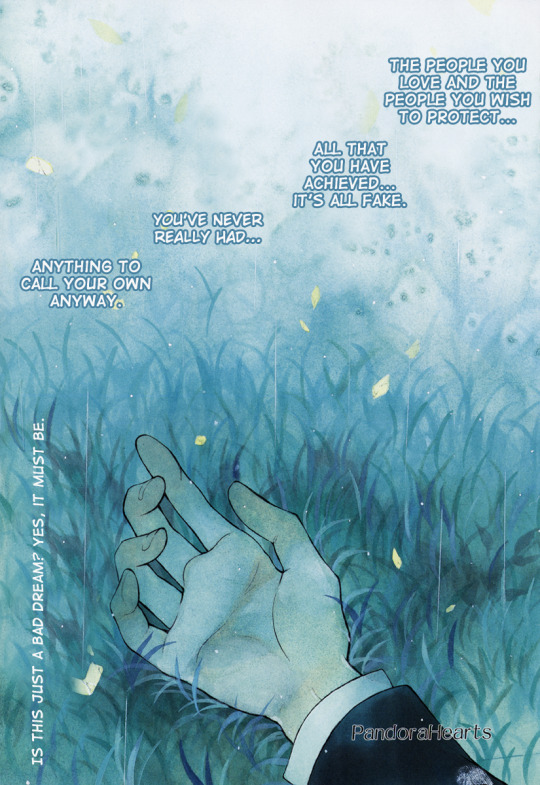
Jack drills these ideas into Oz’s head when he is at his most vulnerable. This is when Oz breaks down and becomes convinced that all of Jack’s statements are true. He is not who he thought he was; he never has been, and so his life is meaningless.
This is arguably when Oz reaches his all-time emotional low. While it was already addressed that he had been struggling intensely with his mental health and was probably suicidal, up to this point, he always retained some level of self-preservation (however slight). Now, he silently accepts that the world would be better off without him and offers no physical or emotional resistance to his own execution. Jack’s words worm their way into his heart and corrupt his self-image to the point where his only reaction to Oswald’s sword swinging towards him is a blank, unflinching stare.

Trauma Response
It’s not uncommon for Jack to manifest during catastrophic moments--that is, whenever a situation triggers (or comes close to triggering) overwhelming memories of Oz’s trauma. When Oz is losing control over his emotional and physical faculties, Jack often encourages him to make the trigger disappear using the quickest and easiest method available. Unsurprisingly, this method generally takes advantage of Oz’s extraordinary powers. In other words, the “tactic” Jack advises Oz to use is simply mindless destruction.
In the second half of the manga, Oz is at his least emotionally stable. It is not a coincidence that this is also the point during which Jack gains the ability to completely hijack Oz’s body. This development allows Jack to commit impulsive acts of aggression through Oz, while Oz himself retains little to no control.
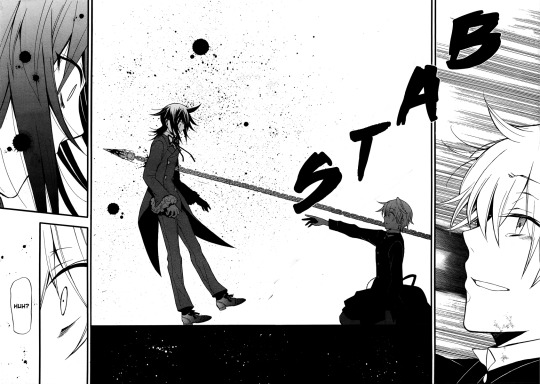
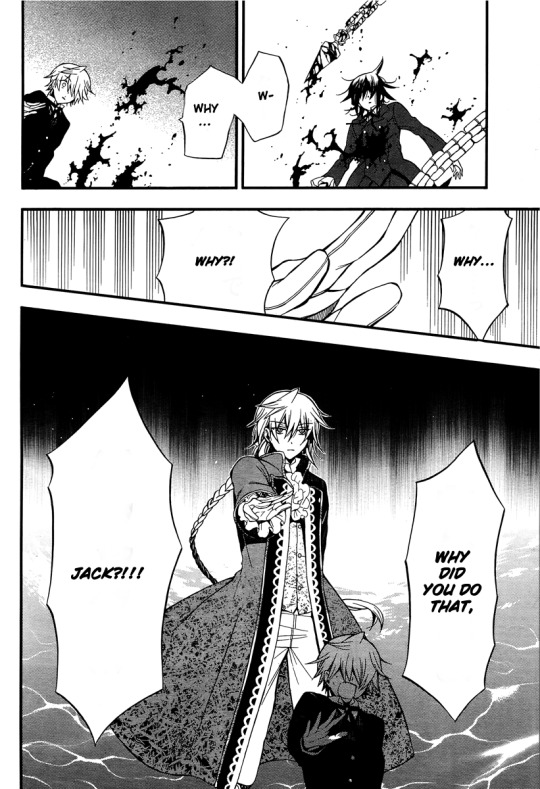
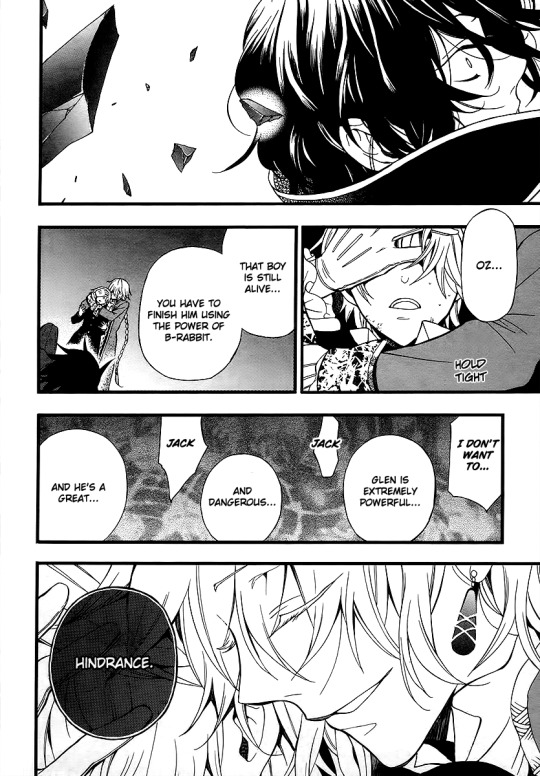
Jack overwhelms Oz with unnecessary flashbacks to traumatic events and makes an excess of harmful connections between past and present circumstances. Oz’s panicked, distressed responses to this are tools he uses to further coax Oz into acting in a self-destructive manner. These tendencies may not only connect Jack to the concept of depression, but the concept of post-traumatic stress disorder as well.
Identity Crisis
Although Jack is introduced extremely early in the manga, one of the story’s main mysteries is the exact nature of his connection to Oz. This relationship shifts several times, especially with regards to who is “in control” and who is the true “owner” of the physical body.
Once it becomes public knowledge that Jack is “within” Oz, the identity of the former overcomes the identity of the latter in the eyes of the general populace. Figures who never before gave Oz a second glance begin to pay incredibly close attention to him; many directly address him through his connection to Jack rather than as a separate entity.
Oz is deeply troubled by the way others ignore him in favor of an aspect of his identity that he feels does not truly represent him--an aspect of his identity that is at least partially out of his control. However, he is also relatively resigned to being judged in this manner. He lacks knowledge of how to change this circumstance because even he does not truly understand the extent to which he and Jack are connected.
It is true that at this point in the story, Jack is practically worshipped. His destructive actions and devastatingly selfish nature have not yet been exposed. Because of this, Oz as Jack’s “vessel” is typically viewed through a positive lens. Still, this situation reflects how people with depression are sometimes reduced to nothing more than a mental illness by their peers. Because others do not understand (and mental illness is stigmatized), they start to see us as “different” in some indefinable but undeniable way, and our existence becomes that particular part of ourselves in their eyes.
As time passes, the line between Jack and Oz becomes more and more blurred. Questions are raised about whether they are the same person or, on the contrary, whether they are similar at all. At what is arguably the climax of the manga, Jack declares that Oz’s body is, was, and will always be his possession; he claims that in reality, there is no “Oz,” only “Jack.”
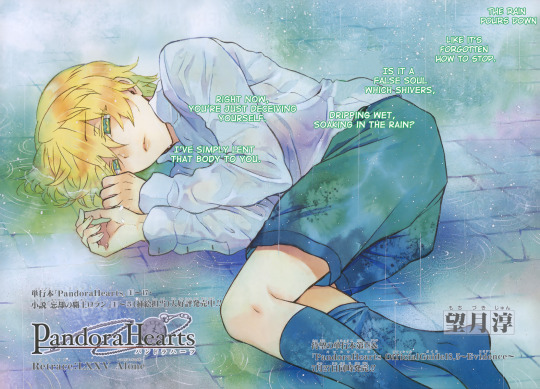
This thought haunts Oz intensely and sends him into a rapid downward spiral. Like the sentiments expressed near the end of the “emotional abuse” section of this analysis, the idea that Oz’s body belongs to Jack is backed up by rigid, literal plot elements. However, if we view this emotional catastrophe using a symbolic perspective, it is a representation of yet another common struggle endured by those with depression.
We come to ask ourselves who we really are. Was there truly a time when we weren’t “like this?” Could we truly escape this misery in the future? Who would we be if we were to stop feeling this way? Do we even exist without depression? Does Oz even exist without Jack?
Visual Symbolism
It is a classic literary device to represent hope through light and despair through darkness. The manga is rife with this exact type of symbolism, utilizing it to describe how the Abyss has changed throughout time, Break’s dwindling eyesight, and the oscillating emotional states of various characters.
As I stated previously, Jack and Oz interact almost exclusively within the latter’s mind. The landscape drawn in the background of these conversations initially possesses a watery, clear appearance. However, as it becomes increasingly clear that Jack’s presence is deeply damaging to Oz’s psyche, this same landscape becomes overwhelmingly tainted by dark, ink-like shadows.
Closer examination reveals that this “pollution” originates directly from Jack--and it reaches its peak once Jack’s intentions have been fully disclosed. Not only is Oz’s mind visibly corrupted by darkness, but Jack himself appears as an almost inhuman figure composed of these shadows.
There is another level of visual symbolism as well--namely, the fact that Jack becomes increasingly physically aggressive and disrespectful towards Oz. In the first half of the manga, he primarily speaks to Oz from a distance, occasionally reaching out a hand in his direction. This is clearly not so in the second half of the manga, at which point Oz begins to defy his influence and it becomes vital that he subjugate him as quickly as possible.
By this time, Jack is almost always seen either restraining or caressing Oz. Even in the latter situation, when his touches are lingering and vaguely affectionate, they are possessive and constraining. In other words, though they appear different on the surface, both actions are ultimately methods of forcing Oz’s submission. It can be said that this represents his desire to gain complete control over all aspects of Oz’s being, as well as his total lack of respect for Oz’s physical and emotional autonomy.
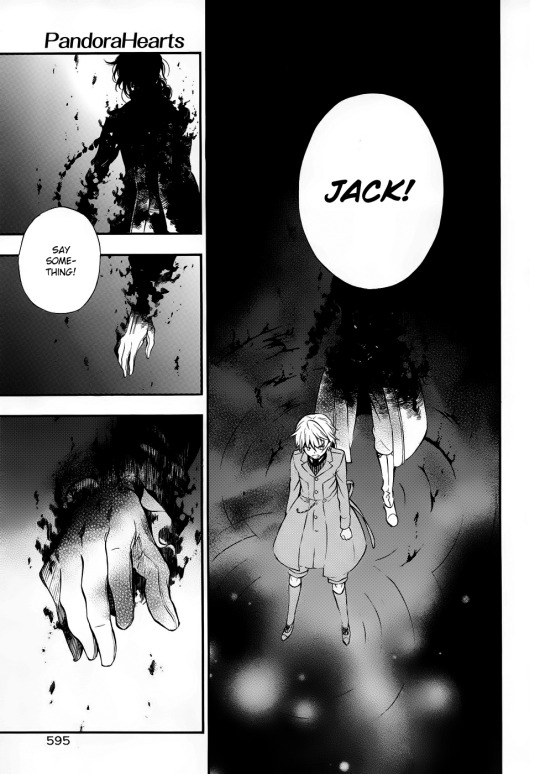
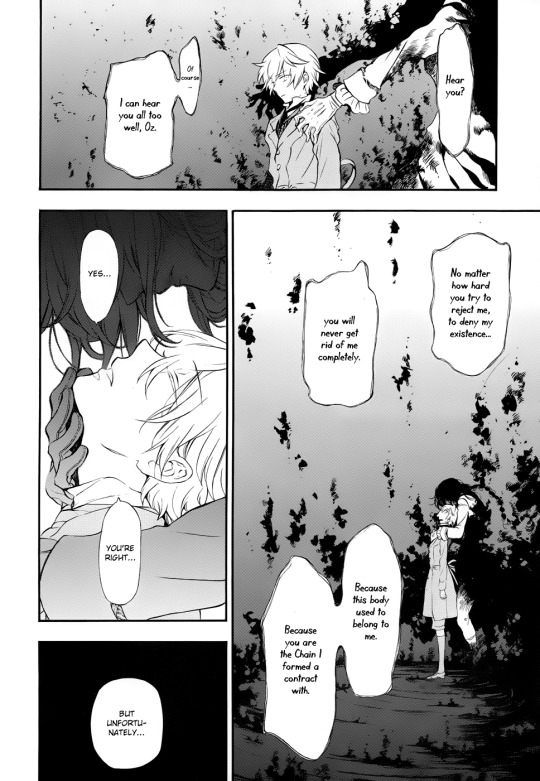
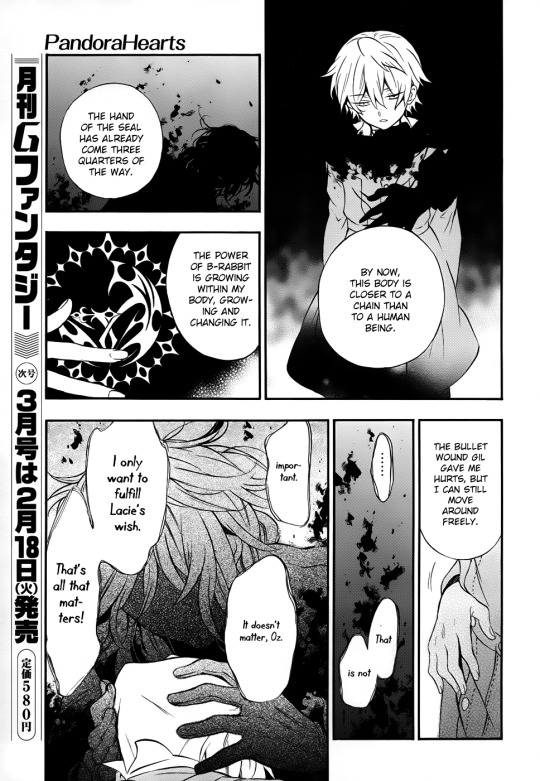
It can be argued that both of these aspects of symbolism reach their pinnacle even before this point. Oz realizes his own worth when Oscar says he loves him and reveals that his greatest desire is for him to be happy. When Oz is at last able to grasp that he is loved and there is hope within his life, Jack immediately reaches out to grab him. And in one of the manga’s subtlest but most poignant moments, his hand crumbles to dust upon touching Oz.
What follows is an extremely impactful display of Oz’s character development. He recalls Jack’s previous statements declaring his achievements worthless, denouncing the love he received from others as fake, and degrading his worth. Then he furiously rejects all of them, thrusting out a hand to push Jack away from him and consuming Jack in an explosion of light.
The conclusion to be drawn from this is that Jack essentially lives off Oz’s misery. When Oz understands and is able to accept that he is not worthless, Jack is suddenly rendered utterly powerless.
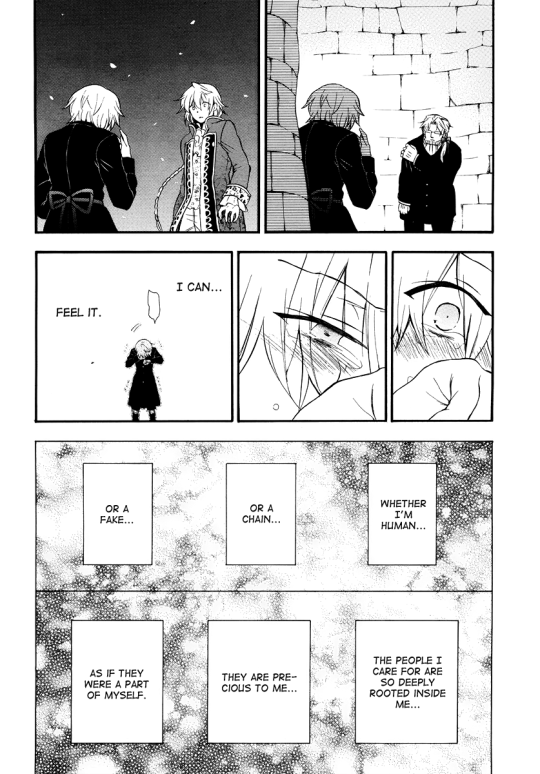
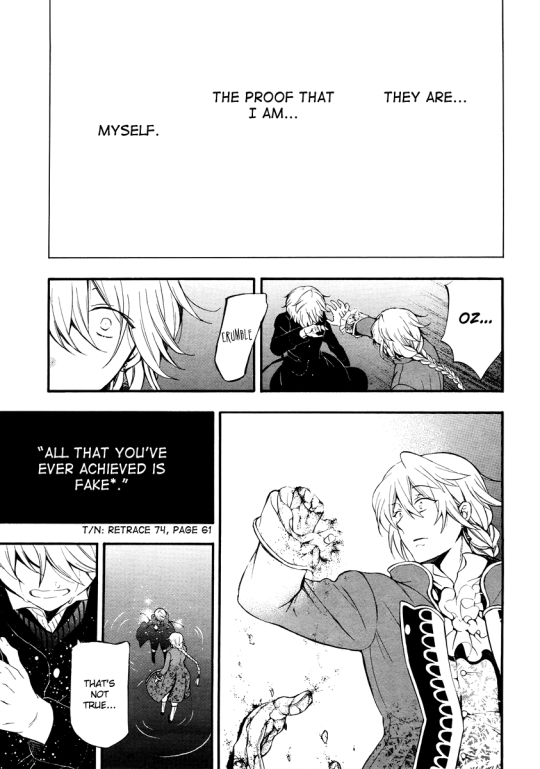
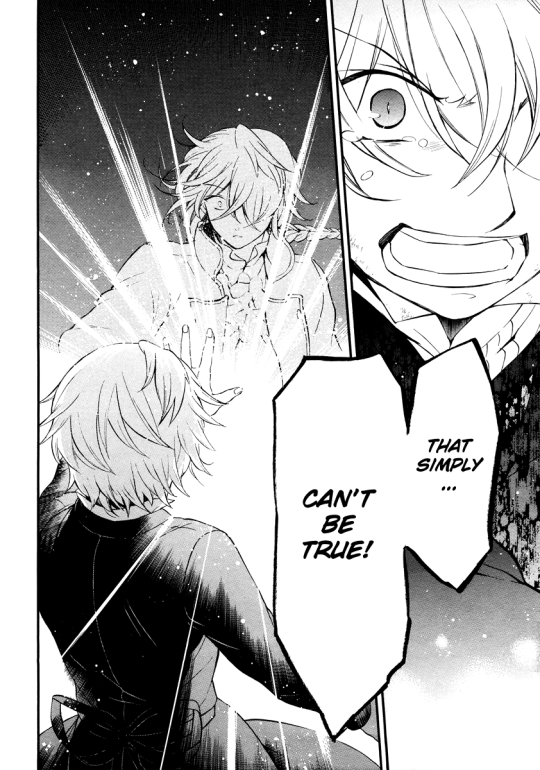
The manga culminates in a scene that coincides with this symbolism. This late into the story, Oz has succeeded in transcending Jack’s influence almost entirely, but Jack is not quite ready to let go. Though they stand together within a void, glimmers of light linger around Oz--despite everything, his life has come to be surrounded by hope and love.
As Oz floats towards the path of light above, Jack reaches out and takes hold of his wrist. But his grip is feeble and hesitant, representing how little control he truly holds over Oz at this point. Perhaps attempting to provoke guilt or regret, Jack asks Oz if he is certain that he is prepared to move on without him, but Oz has grown too much to succumb to this manipulation.
Without delay, Oz replies that there is no reason for him to stay, and Jack finally releases him. He escapes into the light--into a world full of people who care about him, into a life where he is happy to be alive.
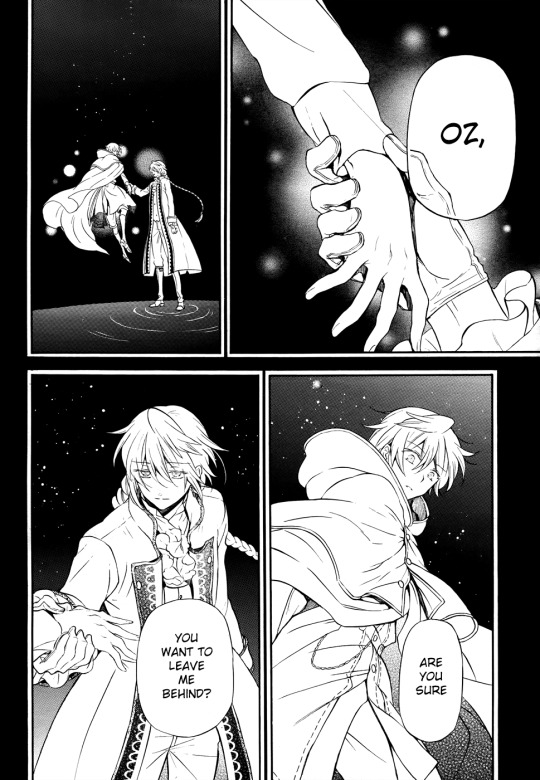
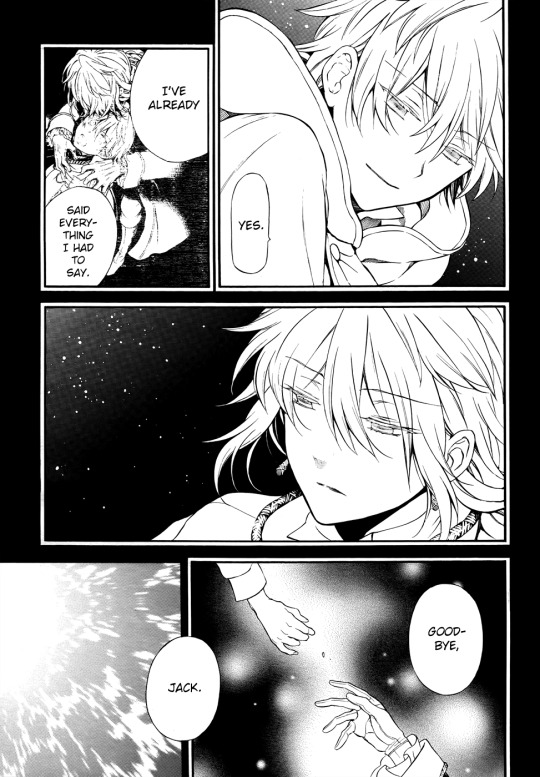
#PandoraHearts#Pandora Hearts#Jack Vessalius#character analysis#Oz Vessalius#analysis#Cyokie's thoughts
164 notes
·
View notes
Text

[copied over from my cr blog, also this is gonna get long, i’d apologise but im not sorry]
okay, so
this is a rant probably about 7 years in the making, bc when i first watched lok i had not done any music study, i had not done any composing of my own, my knowledge of music theory was at a primary school level and i still thought tv soundtracks were just made by one person composing a whole cache of music and then the audio editors pick and choose what track to place where
(spoiler alert that’s not how film and tv scoring works, i have now done a music composition course where we had to score a short film, among other things, and i have so much more respect for tv composers jesus christ)
but this one stuck out to me even way back then, bc me barely knowing what a leitmotif was was like “hey this one little refrain keeps popping up whenever bolin does lavabending, and i like it, i’m gonna see if it’s on the soundtrack”
it was not, and that’s sort of where i left it back in 2014, but i actually did a rewatch of lok pretty recently out of nostalgia, and then noticed it even more
and to explain why (and this is also a little bit why five’s stuck out to me in tua, i’ll get to that in another ask), let’s cover, leitmotifs, and tv scoring in general
so a leitmotif is basically just a short musical idea that represents something in a piece of music. when i studied motivic development we were encouraged to make that motif four notes or less, and then develop it into something longer (aka a theme), because if you can constantly come back to a really short idea while keeping the piece moving, that’s what makes a piece of music memorable
(you can ignore those rules on purpose but that’s a different essay)
so the most common way that a leitmotif shows up in soundtracks is to represent a character or a location - you play the motif when that character shows up or when you’re in that location and boom, the audience associates that motif with that person place or thing, and you can then use this to tell the audience things without actually telling them. for example, star wars playing the imperial march whenever someone does something darth vader related - darth vader isn’t on screen, but you can feel his presence, because his music is playing
and if we were a film score, where we have two hours to show one particular character’s development, great! we give them a simple motif, and then as they grow as a person we change their motif to reflect what is happening to them, until we end up with something that communicates on a subconscious level how much they’ve grown. we toss in as much symbolism as we can, and we have a really great soundtrack that’s instantly memorable
tv scoring, is harder. partially because of time constraints (have you ever composed half an hour of original music a week, and had to make sure it fits perfectly with every beat of what’s happening on screen? these guys have), partially because there’s a much larger focus on ensemble casts
so what atla and lok do, for the most part, is not score individual character motifs for everyone. this is fairly common in tv soundtracks, instead we score ideas, concepts, and feelings - these’ll come up a lot more and give you more information than just “oh hey this character’s on screen”
the avatar state, for example, has the strongest and most recognisable theme across both shows. i’m linking an atla track in here because it has the best example but you’ll know this shows up with korra too - and with particularly important moments for wan, for kyoshi, etc. they also appear in the opening of both shows, four strong notes that start and end on the same note (in the case of what i’m linking, it’s an F#)
youtube
the first part of this track is the more uncertain, pensive theme that comes up when both avatars are feeling doubt/worry/sadness, but then it transitions into the more recognisable four. worth noting though, those are both basically the same motif. if i write them out back to back, you’ll notice they both have four notes and start and end on F#. if i had to guess, four notes four elements, and it comes back to the start because the avatar is a cycle.

korra has a theme for when she’s fighting, but not an individual character theme. the airbenders as a concept have a theme, republic city has thematic instruments, as do some big name characters, like iroh and his tsungi horn (this is also a cross-series thing, he’s always playing it in atla, it shows up when zuko has to make big moral decisions, and when we first meet iroh in the spirit world in lok, it shows up there too, to let the audience know who this is before we properly see him)
so, if korra doesn’t get a single theme and instead has several for different aspects of her life, and mako and asami follow along with the mood of the story like all the other characters, the fact that bolin has a personal leitmotif at all, let alone a solid, developing one, is pretty remarkable!
now, granted, it mostly starts with book 3, before then he was like every other character, but it has clear symbolism through those last two books! and, initially i thought it was related only to his lavabending, since that’s most of when it shows up, but since my rewatch, i’ve started calling it his hero theme
see, when people wanna criticise mako and bolin, usually the comments they get are that bolin’s too immature and mako’s too serious/uptight. but like, that’s how they work, you can’t analyse either of them without the context of the other. since they were little kids on the streets, bolin chases his heart and mako makes sure they don’t die from it, that is their entire childhood. and neither would have got here on their own because mako wouldn’t take the necessary risks and bolin wouldn’t take the necessary precautions. (like. remove either one from the equation and they’d still be working for the triple threats bc s1 and their flashback miniseries make pretty clear that bolin got them out and mako kept them out)
and then book 2 proves it! because it splits team avatar up, and what happens? bolin is totally taken advantage of by varrick and used as a pawn in his evil plan and mako ends up in jail
so what’s book 3, to them? it’s, being able to find themselves without having that codependency. mako no longer has someone to protect, which is what he’s based his whole life around so far - bolin’s doing fine and he’s no longer dating either korra or asami. and bolin’s trying his hand at some of that responsibility (look at how he immediately adopts kai who is explicitly them but younger because he wants to be the older brother for once). most importantly, they find the rest of their family, and stop being defined by being orphans. they don’t have to be that singular piece of a puzzle, they can just be themselves. and that’s where bolin’s character really starts to shine, because that’s when they bring in the bending plot, and bending, perhaps more than any other character, really gets to the heart of who bolin is
if you want more of my thoughts on that i have an essay here, but tl;dr: bolin’s an extremely powerful earthbender, but he’s not a metalbender because metalbending requires you to double down on the earth characteristics and think like an earthbender, and bolin doesn’t, he’s too fluid for that, which is one of his major strengths, so of course he can lavabend
and finally - to his motif itself! (as a note, i’ve put all of these in the same key to show where it repeats, but there’s a variety of keys used in the show)
as far as i can find, it first shows up in s3e8, when bolin stuns p’li with this well placed shot
[Edit: it first showed up in the s2 finale, but again in a simplified version and again with him doing something heroic with earthbending, so we can still start the analysis here]
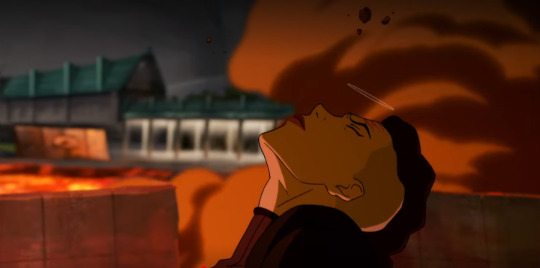
mako volunteers bolin for that job, because he knew bolin was capable of it. why? because bolin landed an identical shot earlier in the episode, after trying to metalbend, getting frustrated he can’t, and cheating with some extremely well aimed earthbending. it’s just a short refrain and you barely notice it, but it’s the first connection of this motif with the theme of bolin’s bending
it looks like this, and it’s always played on a trumpet, which is part of why i call it the hero theme, because, if you’re looking at music from a western perspective, trumpets were used to herald kings, and then used to represent military glory, and then when superhero themes started happening, they used trumpets too - it’s basically western music shorthand for hero these days
(it’s also symmetrical so that helps with the good vibes)

and he’s saving everyone here, so it’s linked to his bending, but it’s also linked to his heroism
it ties the two together, and they are tied together.
when’s the next time it shows up? episode 10, when the brothers are in prison in ba sing se, and bolin tries to metalbend them out. again, he’s doing this to save people, and this motif gets a few notes added on to the end in a raising pattern - they’re inspiring, but they don’t go anywhere. which is exactly what happens in the scene, because he’s trying to go about this in the wrong way. mako believes in him, but it won’t (and doesn’t) work

it appears in episode 12 when bolin saves everyone from ghazan destroying the temple, in a more fancy orchestral remake of the first version - it’s impressive, but it hasn’t actually developed yet, it’s just his discovery of it
the book 3 finale already has its own fucking amazing soundtrack, i love that entire episode’s score, but it gets its own moment there too, and the first real development!
because what we hear is not what we’ve heard before. we know it’s the same theme, because it’s using those signature trumpets, but it’s the second part of this phrase, the answer to the question supplied by the first one. why? because bolin’s figured out who he is and he’s starting to use it. it still hasn’t settled yet though, it’s early days and he’s still just turning ghazan’s lava back on him, so again, it raises, leaving it on a question mark

it doesn’t appear in s4e7 when he lavabends as a warning against the escaped prisoners, because he’s using it as a threat, not to help people. but it does later in the episode when he uses lavabending to save them from kuvira. and that’s when we get the first full phrase, question and answer
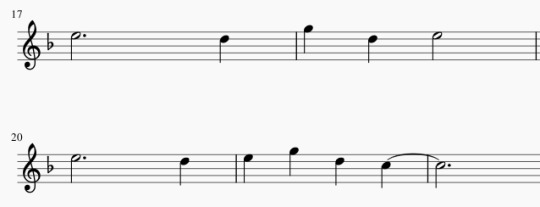
it keeps the first motif identical, takes out the first note of the second, and ties them together - except now it’s not open ended, now it knows where it’s going - it’s been three years, at this point bolin is confident in both himself and his bending
and then that phrase appears all over the place in the finale, because all bolin does is save people - everyone from the exploding building, he slows the giant mecha with lavabending, he saves opal, he slows the giant mecha again by collapsing a building on it, and most importantly, he’s the one rescuing his brother this time, instead of the other way around (though that one doesn’t get a motif appearance bc admittedly a fuck ton of other things are happening in the soundtrack at the time)
so to that question asked in book three - who is bolin when not next to someone else? well, funnily enough, we saw it in book two as well, just in a warped way, playing nuktuk. it just wasn’t truly him because it was created by varrick, and he needed to get away from varrick too. the question put forward by the narrative is who is bolin, and the answer given by the music is, he is a hero. and i don’t know why bolin is the only one to get a theme like this, but i think it may have something to do with the fact that, while everyone in team avatar has been a hero and saved people, he is the only one who has, from the start, solely been motivated by wanting to help people. he follows his heart, and his heart cares, about everyone. it’s been the driving force behind almost everything he’s ever done. and i love him so much
#so yeah those are my thoughts on bolin go forth and cry with me about five notes on a trumpet#legend of korra#lok#bolin#music
30 notes
·
View notes
Text
The Mysterious Benedict Society as an adaption
So far, The Mysterious Benedict Society adaption feels very faithful to the books. There are definitely changes (Constance, for instance, has been aged up, and likely has a different background. This is understandable. It would be nigh impossible to portray her as she is in the books in live action format--for example, none of the kids in the book suspect she’s a toddler, let alone two years old). However, most changes have all felt reasonable and add to plot and pacing.
I especially enjoy the additions: showing the adult side of the team, for example, or Ms. Perumal’s growing concern about Reynie’s whereabouts, or the girls’ nighttime conversations. Some changes are more extreme. The Mr. Curtain of the books is clearly a villain. He’s condescending and rude, and the only people who like him are bullies. Mr. Curtain of the show is much smoother. It’s easy to see how he’s managed to influence people. Similarly, the L.I.V.E. curriculum is much less obnoxious in the show (not just memorizing nonsense by rote), and as a result, the school’s students seem less stupid and cruel. You can see why they enjoy attendance.
I’m particularly pleased that Number Two’s weirdness has been amplified. Mr. Benedict’s found family is delightfully strange, and I love watching their unusual rhythms. It will be easy to believe when (or if) it’s revealed that the women have been legally adopted into Mr. Benedict’s family.
Similarly, I love how they intensified the quirky feel of the setting and characters. Of course Number Two built a house in the woods in a day because she has a woodworking hobby. Of course there’s secret tunnels and drawers and compartments in Mr. Benedict’s house. Of course Milligan’s disguises and mannerisms are wackily memorable instead of just matter-of-fact. The books themselves have a stylized feel at times (they kind of remind me of Lemony Snickett’s A Series of Unfortunate Events, though with none of the grimness).
I love the overall aesthetic. When I first read the books, they didn’t strike me as being set in the past, but the vaguely vintage feeling works excellently. (I was also a fully grown adult before I realized that the Incredibles wasn’t set in the present, so...) The color schemes, costumes, and sets have distinctive feelings and coordinate well. The effect is stylized rather than naturalistic, which is appropriate and amplifies the tone of the scenes. The bright colors and rough textures of the wooded hideout and its inhabitants’ costumes contrast nicely with the clean lines of tL.I.V.E.’s vintage-pastel interior and sleek exterior.
I also enjoyed the way they did Kate’s flashback as rough home footage. Similarly, I enjoyed the way they showed four kids solving problems on the same screen, how they illustrated Reynie’s thought process with overlaid sketches of the problems, and the way words show up on the screen during the tests for emphasis. The combination of animations, showing multiple things at once, and creative angles for emphasis did a great job conveying the feeling of the tests. (Unfortunately, I lack the vocabulary to describe the techniques they used here).
There’s two things I didn’t enjoy. The first was killing Sticky’s parents to make him an orphan. It mattered in the books that he felt rejected by his own parents. Making it his aunt and uncle who (seemingly) care more about money and fame than the child they’re raising feels a little too much like the wicked stepmother trope. I don’t know why the showmakers decided that Of Course They’re All Orphans, because while most of the book characters are orphans, Sticky isn’t, which serves to show that you can feel rejected and hurt by your parents even when you’ve got an ordinary, non-abusive nuclear family. It’s about feeling isolated, whether or not you’re technically alone.
Secondly, all the wheelchairs have been removed from the adaption. I’m not sure why this was done. Sticky’s mother has bad arthritis and requires a wheelchair. In the books, this was done without fanfare; it was as normal as anything else to oil Ms. Washington’s wheelchair in damp weather, or load and unload it from cars in later books. She was more of a background character, so it didn’t affect the plot, but the casual background representation was a welcome contrast to many books that assume being disabled is strange and uncommon, and that disabilities only exist when they’re plot-significant. The aunt who replaced Ms. Washington used no mobility aids, which disappoints me, especially as the woman she replaces in the books is ultimately shown to be a flawed but loving parent who’s dedicated to making up for her mistakes.
The other person missing their wheelchair is Mr. Curtain, the villain. I’m also not sure why this was removed? It could be to avoid the Evil Disabled Villain trope, but in the book, I didn’t feel like his disabilities were treated as a moral flaw or an excuse for his villainy. He shares his narcolepsy with the unquestionably benevolent Mr. Benedict, so it didn’t feel like his condition was used to vilify him.
He and Mr. Benedict act cope with their condition differently: Mr. Benedict relies on trusted family members for support and chooses to sit on the floor and avoid positioning himself in tall places from which he could fall, whereas Mr. Curtain disguises his narcolepsy by wearing mirrored glasses and using a wheelchair that secures an upright posture, so that no one knows when he has an episode. He does use his wheelchair aggressively, banging through doors and zooming around and forcing people to jog and keep up, but it felt like his use of mobility aids grew naturally from his character.
The books also include a scene where he shocks the children by leaving his wheelchair to chase them. They assumed that using a wheelchair=completely unable to walk, a common view in US society. Importantly, I didn’t feel like the scene was framed as particularly deceptive, like he was lying to them by using a wheelchair when he could walk. Rather, it fit into a pattern of Mr. Curtain managing assumptions and expectations: he doesn’t want people to take advantage of his weaknesses, yet wants to hold a few cards close to his chest. He doesn’t have to lie to people, just let them see and hear and assume what they will.
I don’t use a wheelchair or have narcolepsy, so I’m not in a position to say whether or not the books have good representation. Maybe the fact that Mr. Curtain is evil, and also zooms around and bangs through doors, is uncomfortable. Maybe the fact that his nefarious devices are wheelchair-accessible and in fact designed around his chair sends the wrong message. Maybe using mobility aids to conceal a disability sends a bad message, or maybe it would be better if the good guy was the one to use a wheelchair to cope with his disability. I don’t know. I do know that Mr. Benedict’s condition is played for laughs in both the book and show, and that might be uncomfortable. I do think it’s worth noting that Mr. Benedict’s narcolepsy is seen less and less as funny as the books go on, and grows to be seen as an endearing quality that emphasizes how much he loves people, since his attacks usually underscore with strong emotions and convey worry for his loved ones or joy at their company.
My own sense is that both approaches to narcolepsy make sense, and neither is shown to be inherently faulty. Rather, it’s Mr. Curtain’s character that’s to blame for his villainy--his arrogance, condescension, and mistrust. Both characters feel well-developed and consistent, and their disability is only one part of them. Their disability is colorful, but it’s colorful in the same way as the main characters (Sticky’s anxiety and memory, Kate’s gusto, eye for measurement, and bucket, Constance’s precociousness, etc).
As for why Mr. Curtain’s wheelchair was cut, I’m not sure. Maybe the show writers just didn’t want to deal with the ramifications of depicting a villain in a wheelchair, and decided to cut it altogether (a lazy reason, I think). Alternatively, it seems like they’re depicting narcolepsy without cataplexy, eliminating the need for a wheelchair (a better reason).
On the other hand, Mr. Curtain’s attitude and mannerisms bear the least resemblance to his book counterpart of all the show’s characters. They’re incorporating some backstory from the other books to build a secondary plotline, and I’m not sure how it’s going to play out. From what we’ve seen of him so far, S. Q. Pedalian is also drastically different (shy, cloistered, and openly acknowledged as Mr. Curtain’s son, instead of the gregarious, bumbling, misfit Executive of the books). The TV dynamic between him and Mr. Curtain is largely unrevealed as of yet. Since these changes constitute departures from the book, I’m not sure how the future story’s going to play out around them, and what that reveals about why the wheelchair was cut when it was so characteristic of Mr. Curtain’s mannerisms while other things (like Mr. Benedict’s use of plaid) were included.
Still, it does disappoint me that two wheelchairs were erased, and no one in the show uses one, not even background students.
Overall, though, apart from the orphan and wheelchair situation, I’m very pleased with this adaption and think that the pacing works wonderfully. It’s a near-ideal format for a video adaption (I think animation would be best, but this is a close second).
#the mysterious benedict society#the mysterious benedict society adaption#tv adaption#the mysterious benedict society show#ledroptha curtain
44 notes
·
View notes
Text
Doki Doki rambling!
Currently watching Doki Doki. I don’t get why so many people hate it THAT much. I understand Mana can be annoying but I don’t think she’s a Mary Sue (why does everyone use that term so loosely?). She’s got flaws, the problem isn’t that she’s perfect but that the narrative doesn’t put enough focus on them. It could have been great.
It’s almost a running gag that Mana acts too quickly (like when she wanted to visit Makoto and started running, just for Rikka and Alice to tell her she doesn’t know where she is), she pushes herself too much (the fever episode), she doesn’t instantly understand serious topics (befriending Regina while not understanding Makoto’s pov, and later on she even recognises she didn’t understand how Trump Kingdom’s fall felt until it happened to the Earth too) etc. The problem is that the show doesn’t do enough with her, she’s kind of a tool for everyone to develop with. We could’ve had the fever episode concluding in Mana learning to not push herself, understanding that she cannot do everything, etc. We could have more on her friendship with Rikka, and have them learn from each other (Mana could really use Rikka’s cold mind and Rikka, well, she already takes from Mana pushing her into new things). Overall, having a character that works too much and doesn’t care for her safety enough can show children that there are limits, that resting is fine and needed, and that taking care of oneself is not selfishness. Mana could’ve shown us that. But Doki Doki wasn’t serious enough to consider Mana’s overworking more than a joke vjhgjjkhkj.
I think the other problem is that the show does focus on Mana too much, at least on the first half. Mana-Rikka, Mana-Makoto and Mana-Regina are explored a lot. Mana-Alice and Mana-Aguri are not a priority but we see a lot as well. The problem is with any other relationship, at least until ep36 which is the one I’m in. Maybe later I can see more of Rikka and the rest, or Alice and the rest, etc. Aguri and the rest is explored tho, which I found incredibly nice because I actually think she gives us a fresh perspective.
The other characters should have more things with the others. For example, Alice’s flashback episode constantly mentions how Mana inspired her (which fits Mana because she’s got charisma), but it barely mentions Rikka. We could’ve had a Rikka-Alice moment where Alice talks about how fucking clever Rikka is and how she wanted to have a quick mind like hers considering she was the one who found a way out of the hause. Maybe Rikka goes to Alice’s home because of her advanced technology and she likes learning or maybe she just likes chilling with her because Mana’s got ENERGY.
We could’ve had more with the Rikka-Makoto conflict. Maybe instead of it disappearing we could see them talk about it without Mana being there? Just imagine them trying to befriend each other even if they have this “why are you with Mana” feeling. And eventually they bond over different things. Maybe they have something in common, like reading, or maybe they spar together. They’re the serious ones from the team so maybe Rikka becomes invested with helping her make plans to recover Trump Kingdom? And then, after discovering their true personalities, they have a final heart-to-heart admiring each other and how they overcame that shitty feeling of jealousy.
I think it would’ve been interesting to see some conflict between Alice and Makoto as well. Makoto is one of the agressive Cures of the team, her attacks are purely offensive-based and her name is Cure SWORD. Whereas Alice is seemingly deffensive-based in everything she does; hiding her true potential because she’s the most versatile of the team; her attacks are the most flexible and creative, and she can go from defense to ofense in less than a second... BUT Sword doesn’t know this at first. Maybe she thinks Alice doesn’t take things seriously enough and Alice ends up showing her how protection is very important and that it doesn’t mean she cannot defend herself in other ways, proving herself as a skilled fighter. And maybe we could see Makoto develop some defensive ability too? Anyways Makoto is a troubled teen she should’ve taken more time to warm up (but we have to understand Makoto WASN’T MEANT to be there in the first place, she was meant to enter the team midway, but Toei insisted on using her in New Stage 2 so they had to rush her plot).
I won’t speak of Regina because she’s currently disappeared and I know she reappears later and gets a badass song from Makoto. I just think she should be here in the first place ajskwjkjwk she’s one of my favourite characters of all time in PreCure!
#dokidoki precure#doki doki precure#aida mana#mana aida#hishikawa rikka#rikka hishikawa#cure heart#cure diamond#yotsuba alice#alice yotsuba#cure rosetta#kenzaki makoto#makoto kenzaki#cure sword#madoka aguri#aguri madoka#cure ace#regina#doki doki regina#precure regina#ddpc regina#precure#pretty cure
24 notes
·
View notes